
Title: An Onlooker in France 1917-1919
Author: Sir William Orpen
Release date: December 29, 2006 [eBook #20215]
Language: English
Credits: Produced by Geetu Melwani, Christine P. Travers, Chuck
Greif and the Online Distributed Proofreading Team at
http://www.pgdp.net (This file was produced from images
generously made available by The Internet Archive/Canadian
Libraries)

I. Field-Marshal Earl Haig of Bemersyde, O.M., K.T., etc.
This book must not be considered as a serious work on life in France behind the lines, it is merely an attempt to record some certain little incidents that occurred in my own life there.
The only thought I wish to convey is my sincere thanks for the wonderful opportunity that was given me to look on and see the fighting man, and to learn to revere and worship him—that is the only serious thing. I wish to express my worship and reverence to that gallant company, and to convey to those who are left my most sincere thanks for all their marvellous kindness to me, a mere looker on.
Chap.
PREFACE
I.
TO FRANCE (APRIL 1917)
II.
THE SOMME (APRIL 1917)
III.
AT BRIGADE HEADQUARTERS AND
ST. POL (MAY-JUNE 1917)
IV.
THE YPRES SALIENT (JUNE-JULY 1917)
V.
THE SOMME IN SUMMER-TIME (AUGUST 1917)
VI.
THE SOMME (SEPTEMBER 1917)
VII.
WITH THE FLYING CORPS (OCTOBER 1917)
VIII.
CASSEL AND IN HOSPITAL (NOVEMBER 1917)
IX.
WINTER (1917-1918)
X.
LONDON (MARCH-JUNE 1918)
XI.
BACK IN FRANCE (JULY-SEPTEMBER 1918)
XII.
AMIENS (OCTOBER 1918)
XIII.
NEARING THE END (OCTOBER 1918)
XIV.
THE PEACE CONFERENCE
XV.
PARIS DURING THE PEACE CONFERENCE
XVI.
THE SIGNING OF THE PEACE
INDEX
Plate
I.
Field-Marshal Earl Haig of Bemersyde, O.M., K.T., etc.
II.
The Bapaume Road.
III.
Men Resting, La Boisselle.
IV.
A Tank, Pozières.
V.
Warwickshires entering Péronne.
VI.
No Man's Land.
VII.
Three Weeks in France: Shell-shock.
VIII.
Man in the Glare, Two Miles from the Hindenburg Line.
IX.
Air-Marshal Sir H. M. Trenchard, Bart., K.C.B., etc.
X.
A Howitzer in Action.
XI.
German 'Planes visiting Cassel.
XII.
Soldiers and Peasants, Cassel.
XIII.
German Prisoners.
XIV.
View from the old English Trenches, looking towards
La Boisselle.
XV.
Adam and Eve at Péronne.
XVI.
A Grave in a Trench.
XVII.
The Deserter.
XVIII.
The Great Mine, La Boisselle.
XIX.
The Butte de Warlencourt.
XX.
Lieut. A. P. F. Rhys Davids, D.S.O., M.C., etc.
XXI.
Lieut. R. T. C. Hoidge, M.C.
XXII.
The Return of a Patrol.
XXIII.
Changing Billets.
XXIV.
The Receiving-room, 42nd Stationary Hospital.
XXV.
A Death among the Wounded in the Snow.
XXVI.
Some Members of the Allied Press Camp.
XXVII.
Poilu and Tommy.
XXVIII.
Major-General The Right Hon. J. E. B. Seely,
C.B., etc.
XXIX.
Bombing: Night.
XXX.
Major J. B. McCudden, V.C., D.S.O., etc.
XXXI.
The Refugee.
XXXII.
Lieut.-Col. A. N. Lee, D.S.O., etc.
XXXIII.
Marshal Foch, O.M.
XXXIV.
A German 'Plane passing St. Denis.
XXXV.
British and French A.P.M.'s, Amiens.
XXXVI.
General Lord Rawlinson, Bart., G.C.B., etc.
XXXVII.
Albert.
XXXVIII.
The Mad Woman of Douai.
XXXIX.
Field-Marshal Lord Plumer of Messines, G.C.B., etc.
XL.
Armistice Night, Amiens.
XLI.
The Official Entry of the Kaiser.
XLII.
General Sir J. S. Cowans, G.C.B., etc.
XLIII.
Field-Marshal Sir Henry H. Wilson, Bart., K.C.B., etc.
XLIV.
The Right Hon. Louis Botha, P.C., LL.D.
XLV.
The Right Hon. A. J. Balfour, O.M.
XLVI.
President Woodrow Wilson.
XLVII.
The Marquis Siongi.
XLVIII.
A Polish Messenger.
XLIX.
Lord Riddell.
L.
The Right Hon. The Earl of Derby, E.G., etc.
LI.
Signing the Peace Treaty.
LII.
The End of a Hero and a Tank, Courcelette.
LIII.
General Birdwood returning to his Headquarters, Grévillers.
LIV.
A Skeleton in a Trench.
LV.
Flight-Sergeant, R.F.C.
LVI.
N.C.O., Grenadier Guards.
LVII.
Stretcher-bearers.
LVIII.
Man Resting, near Arras.
LIX.
Going Home to be Married.
LX.
Household Brigade passing to the Ypres Salient. Cassel.
LXI.
Ready to Start.
LXII.
A German Prisoner with the Iron Cross.
LXIII.
A Big Gun and its Guardian.
LXIV.
Good-bye-ee.
LXV.
The Château, Thiepval.
LXVI.
German Wire, Thiepval.
LXVII.
Thiepval.
LXVIII.
Highlander passing a Grave.
LXIX.
M. R. D. de Maratrayl.
LXX.
A Man, Thinking, on the Butte de Warlencourt.
LXXI.
Major-General Sir Henry Burstall, K.C.B., etc.
LXXII.
Major-General L. J. Lipsett, C.M.G., etc.
LXXIII.
A Village, Evening (Monchy).
LXXIV.
Christmas Night, Cassel.
LXXV.
Blown Up: Mad.
LXXVI.
A Support Trench.
LXXVII.
Major-General Sir H. J. Elles, K.C.M.G., etc.
LXXVIII.
Dead Germans in a Trench.
LXXIX.
A German Prisoner.
LXXX.
A Highlander Resting.
LXXXI.
Man with a Cigarette.
LXXXII.
Mr. Lloyd George, President Wilson, M. Clemenceau.
LXXXIII.
A Meeting of the Peace Conference.
LXXXIV.
Admiral of the Fleet Lord Wester Wemyss, G.C.B., etc.
LXXXV.
Colonel Edward M. House.
LXXXVI.
Mr. Robert Lansing.
LXXXVII.
The Emir Feisul.
LXXXVIII.
M. Eleutherios Venezelos.
LXXXIX.
Admiral of the Fleet Sir David Beatty, Viscount Borodale of
Wexford, O.M., G.C.B., etc.
XC.
The Right Hon. W. F. Massey, P.C.
XCI.
General The Right Hon. J. C. Smuts, P.C., C.H.
XCII.
The Right Hon. G. N. Barnes, P.C.
XCIII.
The Right Hon. W. M. Hughes, P.C., K.C.
XCIV.
Brigadier-General A. Carton de Wiart, K.C., C.B., etc.
XCV.
M. Paul Hymans.
XCVI.
The Right Hon. Sir Robert Borden, G.C.M.G., etc.
The boat was crowded. Khaki, everywhere khaki; lifebelts, rain and storm, everything soaked. Destroyers, churning through the waves, played strange games all round us. Some old-time Tommies, taking everything for granted, smoked and laughed and told funny stories. Others had the look of dumb animals in pain, going to what they knew only too well. The new hands for France asked many questions, pretended to laugh, pretended not to care, but for the most part were in terror of the unknown.
It was strange to watch this huddled heap of humanity, study their faces and realise that perhaps half of them would meet a bloody end before a new moon was over, and wonder how they could do it, why they did it—Patriotism? Yes, and perhaps it was the chance of getting home again when the war was over. Think of the life they would have! The old song:—
"We don't want to lose you,
But we think you ought to go,
For your King and your Country
Both need you so.
"We
(p. 012)
shall-want you and miss you,
But with all our might and main
We shall cheer you, thank you, kiss you,
When you come back again."
Did they think of that, and all the joys it seemed to promise them? I pray not.
What a change had come over the world for me since the day before! On that evening I had dined with friends who had laughed and talked small scandal about their friends. One, also, was rather upset because he had an appointment at 10.30 the next day—and there was I, a few hours later, being tossed about and soaked in company with men who knew they would run a big chance of never seeing England again, and were certainly going to suffer terrible hardships from cold, filth, discomfort and fatigue. There they stood, sat and lay—a mass of humanity which would be shortly bundled off the boat at Boulogne like so many animals, to wait in the rain, perhaps for hours, before being sent off again to whatever spot the unknown at G.H.Q. had allotted for them, to kill or to be killed; and there was I among them, going quietly to G.H.Q., everything arranged by the War Office, all in comfort. Yet my stomach was twitching about with nerves. What would I have been like had I been one of them?
At Boulogne we lunched at the "Mony" (my companion, Aikman, had been to France before during the war and knew a few things). It was an excellent lunch, and, as we were not to report at G.H.Q. till the next day, we walked about looking at lorries and trains, all going off to the unknown, filled with humanity in khaki weighed down with their packs.

II. The Bapaume Road.
The (p. 013) following morning at breakfast at the "Folkestone Hotel" we sat at the next table to a Major with red tabs. He did not speak to us, but after breakfast he said: "Is your name Orpen?" "Yes, sir," said I. "Have you got your car ready?" "Yes, sir," said I. "Well, you had better drive back with me. Pack all your things in your car." "Yes, sir," said I. He explained to me that he had come to Boulogne to fetch General Smuts' luggage, otherwise he gave us no idea of who or what he was, and off we drove to the C.-in-C.'s house, where he went in with the General's luggage and left us in the car for about an hour. Then we went on to Hesdin, where he reported us to the Town Major, who said he had found billets for us. The Red Tab Major departed, as he said he was only just in time for his lunch, and told us to come to Rollencourt soon and report to the Colonel. The Town Major brought us round to our billet—the most filthy, disgusting house in all Hesdin, and the owner, an old woman, cursed us soundly, hating the idea of people being billeted with her. Anyway, there he left us and went off to his "Mess."
This was all very depressing, so we talked together and went on a voyage of discovery and found an hotel; then we went back to the billet and said "good-bye" to Madame and moved our stuff there. But the hotel wasn't a dream—at least we had no chance of dreaming—bugs, lice and all sorts of little things were active all night. I had been told by the War Office to go slow and not try to hustle people, so we decided we would not go and report to the Colonel till the next day after lunch.
Looking into the yard from my window in the afternoon, I saw two men I knew, one an artist from Chelsea, the (p. 014) other a Dublin man, who used to play lawn tennis. They were "Graves." My Dublin friend was "Adjutant, Graves," in fact he proudly told me that "Adjutant, Graves, B.E.F., France," would always find him. We dined with them that night at H.Q. Graves. They were very friendly, and said we could travel all over the back of the line by going from one "Graves" to another "Graves." All good chaps, I'm sure, and cheerful, but we did not do it.
The next day after lunch we drove to Rollencourt, and found the Major in his office (a hut on the lawn in front of the château). He left, and returned to say the Colonel could not see us then. Would we come back at 5 p.m.? So off we went and sat by the side of the road for two hours. Then again to the Major's at 5 p.m., when he informed us the Colonel had gone out. Would we come back at 7 p.m.? (No tea offered.) This we did and waited until 7.50, when the Major informed us that the Colonel would not see us that evening, but we were to report the next morning at 9 a.m. (No dinner offered.) We left thinking very hard—things did not seem so simple after all. We reported at 9 a.m. and waited, and got a message at 11 a.m. that the Colonel would see us, and we were shown in to a wizened, sour-faced little man, his breast ablaze with strange colours. I explained to him that I did not like the billets at Hesdin, that Hesdin was too far away from anything near the front, and that I intended to go to Amiens at once. To my surprise he did not seem to object, and just as we were leaving, he said: "By the way, General Charteris wants you to go and see him this morning. You had better go at once." So that was it! If General Charteris had not sent that message I might not have been admitted to the presence (p. 015) of the Colonel for weeks. Off we went, full of hope, packed our bags and on to G.H.Q. proper, and got in to see the General at once—a bluff, jovial fellow who said: "You go anywhere you like, do anything you like, but don't ask me to get any Generals to sit to you; they're fed up with artists." I said: "That's the last thing I want." "Right," said he, "off you go." So we "offed" it to Amiens, arriving there about 7 p.m. on a cold, black, wet night. We went to see the Allied Press "Major," to find out some place to stop in, etc. Again we were rather depressed. The meeting was very chilly, the importance of the Major was great—the full weight and responsibility of the war seemed on him. "The Importance of being Ernest" wasn't in it with him. As I learnt afterwards, when he came in late for a meal all the other officers and Allied Press correspondents stood up. Many a time I got a black look for not doing so. However, he advised the worst and most expensive hotel in the town, and off we went (no dinner offered), rather depressed and sad.

III. Men resting. La Boisselle.
Amiens was the one big town that could be reached easily from the Somme front for dinner, so every night it was crowded with officers and men who had come back in cars, motor-bikes, lorries or any old thing in or on which they could get a lift. After dinner they would stand near the station and hail anything passing, till they found something that would drop them near their destination. As there was an endless stream of traffic going out over the Albert and Péronne Roads during that time (April 1917), it was easy.
Amiens is a dirty old town with its seven canals. The cathedral, belfry and the theatre are, of course, wonderful, but there is little else except the dirt.
I remember later lunching with John Sargent in Amiens, after which I asked him if he would like to see the front of the theatre. He said he would. When we were looking at it he said: "Yes, I suppose it is one of the most perfect things in Europe. I've had a photograph of it hanging over my bed for the last thirty years."
But Amiens was a danger trap for the young officer from the line, also for the men. "Charlie's Bar" was always full of officers; mirth ran high, also the bills for drinks—and the drink the Tommies got in the little cafés was terrible stuff, and often doped.
Then, when darkness came on, strange women—the riff-raff from (p. 017) Paris, the expelled from Rouen, in fact the badly diseased from all parts of France—hovered about in the blackness with their electric torches, and led the unknowing away to blackened side-streets and up dim stairways—to what? Anyway, for an hour or so they were out of the rain and mud, but afterwards? Often did I go with Freddie Fane, the A.P.M., to these dens of filth to drag fine men away from disease.

IV. A Tank. Pozières.
The wise ones dined well—if not too well—at the "Godbert," with its Madeleine, or the "Cathedral," with its Marguerite, who was the queen of the British Army in Picardy, or, not so expensively, at the "Hôtel de la Paix." Some months later the club started, a well-run place. I remember a Major who used to have his bath there once a week at 4 p.m. It was prepared for him, with a large whisky-and-soda by its side. What more comfort could one wish? Then there were dinners at the Allied Press, after which the Major would give a discourse amid heavy silence; then music. The favourite song at that time was:—
"Jackie Boy!
Master?
Singie well?
Very well.
Hey down,
Ho down,
Derry, Derry down,
All among the leaves so green, O.
"With my Hey down, down,
With my Ho down, down,
Hey down,
Ho down,
Derry, Derry down,
All among the leaves so green, O."
Later, (p. 018) perhaps, if the night was fine, the Major would retire to the garden and play the flute. This was a serious moment—a great hush was felt, nobody dared to move; but he really didn't play badly. And old Hale would tell stories which no one could understand, and de Maratray would play ping-pong with extraordinary agility. It would all have been great fun if people had not been killing each other so near. Why, during that time, the Boche did not bomb Amiens, I cannot understand, it was thick every week-end with the British Army. One could hardly jamb oneself through the crowd in the Place Gambetta or up the Rue des Trois Cailloux. It was a struggling mass of khaki, bumping over the uneven cobblestones. What streets they were! I remember walking back from dinner one night with a Major, the agricultural expert of the Somme, and he said, "Don't you think the pavement is very hostile to-night?"
I shall never forget my first sight of the Somme battlefields. It was snowing fast, but the ground was not covered, and there was this endless waste of mud, holes and water. Nothing but mud, water, crosses and broken Tanks; miles and miles of it, horrible and terrible, but with a noble dignity of its own, and, running through it, the great artery, the Albert-Bapaume Road, with its endless stream of men, guns, food lorries, mules and cars, all pressing along with apparently unceasing energy towards the front. Past all the little crosses where their comrades had fallen, nothing daunted, they pressed on towards the Hell that awaited them on the far side of Bapaume. The mud, the cold, the noise, the misery, and perhaps death;—on they went, plodding through the mud, those wonderful men, perhaps singing one of their cheer-making songs, such as:—
"I
(p. 019)
want to go home.
I want to go home.
I don't want to go to the trenches no more,
Where the Whizz-bangs and Johnsons do rattle and roar.
Take me right over the sea,
Where the Allemande can't bayonet me.
Oh, my!
I don't want to die,
I want to go home."

V. Warwickshires entering Péronne.
How did they do it? "I want to go home."—Does anyone realise what those words must have meant to them then? I believe I do now—a little bit. Even I, from my back, looking-on position, sometimes felt the terrible fear, the longing to get away. What must they have felt? "From battle, murder and sudden death, Good Lord, deliver us."
On up the hill past the mines to Pozières. An Army railway was then running through Pozières, and the station was marked by a big wooden sign painted black and white, like you see at any country station in England, with POZIÈRES in large Roman letters, but that's all there was of Pozières except a little red in the mud. I remember later, at the R.F.C. H.Q., Maurice Baring showed me a series of air-photographs of Pozières as it was in 1914, with its peaceful little streets and rows of trees. What a contrast to the Pozières as it was in 1917—MUD. Further on, the Butte stood out on the right, a heap of chalky mud, not a blade of grass round it then—nothing but mud, with a white cross on the top. On the left, the Crown Prince's dug-out and Gibraltar—I suppose these have gone now—and Le Sars and Grévillers, at that time General Birdwood's H.Q., where the church had been knocked into a fine shape. I tried to draw it, but was much put off by air fighting. It seemed a favourite spot for this.
Bapaume (p. 020) must always have been a dismal place, like Albert, but Péronne must have been lovely, looking up from the water; and the main Place must have been most imposing, but then it was very sad. The Boche had only left it about three weeks, and it had not been "cleaned up." But the real terribleness of the Somme was not in the towns or on the roads. One felt it as one wandered over the old battlefields of La Boisselle, Courcelette, Thiepval, Grandcourt, Miraumont, Beaumont-Hamel, Bazentin-le-Grand and Bazentin-le-Petit—the whole country practically untouched since the great day when the Boche was pushed back and it was left in peace once more.
A hand lying on the duckboards; a Boche and a Highlander locked in a deadly embrace at the edge of Highwood; the "Cough-drop" with the stench coming from its watery bottom; the shell-holes with the shapes of bodies faintly showing through the putrid water—all these things made one think terribly of what human beings had been through, and were going through a bit further on, and would be going through for perhaps years more—who knew how many?
I remember an officer saying to me, "Paint the Somme? I could do it from memory—just a flat horizon-line and mud-holes and water, with the stumps of a few battered trees," but one could not paint the smell.
Early one morning in Amiens I got a message from Colonel John Buchan asking me to breakfast at the "Hôtel du Rhin." While we were having breakfast, there was a great noise outside—an English voice was cursing someone else hard and telling him to get on and not make an ass of himself. Then a Flying Pilot was pushed in by an Observer. The Pilot's hand and arm were temporarily bound up, but blood (p. 021) was dropping through. The Observer had his face badly scratched and one of his legs was not quite right. They sat at a table, and the waiter brought them eggs and coffee, which they took with relish, but the Pilot was constantly drooping towards his left, and the drooping always continued, till he went crack on the floor. Then the Observer would curse him soundly and put him back in his chair, where he would eat again till the next fall. When they had finished, the waiter put a cigarette in each of their mouths and lit them. After a few minutes four men walked in with two stretchers, put the two breakfasters on the stretchers, and walked out with them—not a word was spoken.

VI. No Man's Land.
I found out afterwards that the Pilot had been hit in the wrist over the lines early that morning and missed the direction back to his aerodrome. Getting very weak, he landed, not very well, outside Amiens. He got his wrist bound up and had asked someone to telephone to the aerodrome to tell them that they were going to the "Rhin" for breakfast, and would they send for them there?
After I had been in Amiens for about a fortnight, going out to the Somme battlefields early in the morning and coming back when it got dark, I received a message one evening from the Press "Major" to go to his château and ring up the "Colonel" at Rollencourt, which I did. The following was the conversation as far as I remember:—
"Is that Orpen?"
"Yes, sir."
"What do you mean by behaving this way?"
"What way, please, sir?"
"By not reporting to me."
"I'm (p. 022) sorry, sir, but I do not understand."
"Don't you know you must report to me, and show me what work you have been doing?"
"I've practically done nothing yet, sir."
"What have you been doing?"
"Looking round, sir."
"Are you aware you are being paid for your services?"
"Yes, sir."
"Well, report to me and show me your work regularly.—Tell the Major to speak to me."
The Major spoke, and I clearly heard him say my behaviour was damnable.
This wonderful Colonel expected me to work all day, and apparently, in the evening, to take what I had done and show it to him—the distance by motor to him and back was something like 110 miles!
I saw there was nothing for it, if I wanted to do my work, but to fight, so I decided to lay my views of people and things before those who were above the Colonel. This I did, and had comparative peace, but the seed of hostility was sown in the Colonel's Intelligence (F) Section, G.H.Q., as I think it was then called, and they made me suffer as much as was in their power.
A fair spring morning—not a living soul is near,
Far, far away there is the faint grumble of the guns;
The battle has passed long since—
All is Peace.
At times there is the faint drone of aeroplanes as
They pass overhead, amber specks, high up in the blue;
Occasionally there is the movement of a rat in the
Old battered trench on which I sit, still in the
Confusion in which it was hurriedly left.
The sun is baking hot.
Strange odours come from the door of a dug-out
With its endless steps running down into blackness.
The land is white—dazzling.
The distance is all shimmering in heat.
A few little spring flowers have forced their way
Through the chalk.
He lies a few yards in front of the trench.
We are quite alone.
He makes me feel very awed, very small, very ashamed.
He has been there a long, long time—
Hundreds of eyes have seen him,
Hundreds of bodies have felt faint and sick
Because of him.
Then this place was Hell,
But now all is Peace.
And the sun has made him Holy and Pure—
He and his garments are bleached white and clean.
A
(p. 024)
daffodil is by his head, and his curly, golden
Hair is moving in the slight breeze.
He, the man who died in "No Man's Land," doing
Some great act of bravery for his comrades and
Country—
Here he lies, Pure and Holy, his face upward turned;
No earth between him and his Maker.
I have no right to be so near.

VII. Three Weeks in France. Shell shock.
About this time Freddie Fane (Major Fane, A.P.M.) sent me up to his old division, which was then fighting in front of Péronne. We arrived on a lovely afternoon at Divisional H.Q., which were in a pretty fir-wood, and consisted of beautifully camouflaged little huts. The guns were booming a few miles off, but everything was very peaceful there, and the dinner was excellent; but, just as we finished, the first shell shrieked overhead, and this I was told afterwards went on all night. Personally I had another large whisky-and-soda, and slept like a log.
The next morning the General's A.D.C. motored me to a village about four kilometres off and handed me over to a 2nd Lieutenant, who walked me off to Brigade H.Q. These were behind an old railway embankment. Everyone was most kind, but I saw no quiet place to work. Everyone was rushing about, and the noise of the guns was terrific. The young 2nd Lieutenant advised me to take the men I wanted to draw and to go to the other side of the embankment. He said that there was no one there and that I could work in peace, and he was right. The noise from our batteries immediately gave me a bad headache, but apparently the Boche did not respond at all till the afternoon. Then they started, and the noise was HELL. Whenever there was a big bang I couldn't help giving (p. 026) a jump. The old Tommy I was drawing said, "It's all right, Guv'ner, you'll get used to it very soon." I didn't think so, but to make conversation I said: "How long is it since you were home?"
"Twenty-two months," said he.
"Twenty-two months!" said I.
"Yes," said he, "but one can't complain. That bloke over there hasn't been home for twenty-eight."
What a life! Twenty-four hours of it was enough for me at a time. Before evening came my head felt as if it were filled with pebbles which were rattling about inside it. After lunch I sat with the Brigadier for a time and watched the men coming out from the trenches. Some sick; some with trench feet; some on stretchers; some walking; worn, sad and dirty—all stumbling along in the glare. The General spoke to each as they passed. I noticed that their faces had no change of expression. Their eyes were wide open, the pupils very small, and their mouths always sagged a bit. They seemed like men in a dream, hardly realising where they were or what they were doing. They showed no sign of pleasure at the idea of leaving Hell for a bit. It was as if they had gone through so much that nothing mattered. I was glad when I was back at Divisional H.Q. that evening. We had difficulty on one part of the road, as a "Sausage" had been brought down across it.
Shortly afterwards I went to live at St. Pol, a dirty little town, but full of character. The hotel was filthy and the food impossible. We ate tinned tongue and bully-beef for the most part. Here I met Laboreur, a Frenchman, who was acting as interpreter—a very good artist. I think his etchings are as good as any line work the war has produced. A (p. 027) most amusing man. We had many happy dinners together at a little restaurant, where the old lady used to give us her bedroom as a private sitting-room dining-room. It was a bit stuffy, but the food was eatable.

VIII. Man in the Glare. Two miles from the Hindenburg Line.
One fine morning I got a message, "Would I ring up the P.S. of the C.-in-C. at once?" so I went to the Camp Commandant's office. No one was there except a corporal, so I asked him to get through to Sir Philip Sassoon, and said that I would wait outside till he did so. Presently he called me in, and Sassoon said I was to paint the Chief, and would I come to lunch the next day at Advanced H.Q., G.H.Q.? after which we talked and laughed a bit. When I hung up the receiver, I turned round, and there was a large A.S.C. Colonel glaring at me. I was so taken aback, as I had not heard him come in, that I didn't even salute him. He roared at me, "Are you an S.S.O.?" (Senior Supply Officer). "No," said I, "I'm a painter!" I never saw a man in such a fury in my life. I thought he was going to hit me. However, I made him understand in the end that I really was speaking the truth and in no way wanted to be cheeky.
I had lunch at Advanced G.H.Q. the next day. The C.-in-C. was very kind, and brought me into his room afterwards, and asked me if everything was going all right with me. I told him I had a few troubles and was not very popular with certain people. He said: "If you get any more letters that annoy you, send them to me and I'll answer them." I went back to St. Pol with my head in the air. A great weight seemed to have been lifted off me.
Sir Douglas was a strong man, a true Northerner, well inside himself—no pose. It seemed it would be impossible to upset him, impossible to make him show any strong feeling, and (p. 028) yet one felt he understood, knew all, and felt for all his men, and that he truly loved them; and I knew they loved him. Never once, all the time I was in France, did I hear a "Tommy" say one word against "'Aig." Whenever it became my honour to be allowed to visit him, I always left feeling happier—feeling more sure that the fighting men being killed were not dying for nothing. One felt he knew, and would never allow them to suffer and die except for final victory.
When I started painting him he said, "Why waste your time painting me? Go and paint the men. They're the fellows who are saving the world, and they're getting killed every day."
The second time I was there, just after lunch, the Chief had gone to his room, and several Generals, Colonel Fletcher, Sassoon and myself were standing in the hall, when suddenly a most violent explosion went off, all the windows came tumbling in, and there was great excitement, as they thought the Boche had spotted the Chiefs whereabouts. The explosions went on, and out came the Chief. He walked straight up to me, laid his hand on my shoulder and said: "That's the worst of having a fellow like you here, Major. I thought the Huns would spot it," and, having had his joke, went back to his work. He was a great man. It turned out to be a munition dump which had exploded near by, and the noise was deafening for about eight hours.
This was the time of the great fight round the chemical works at Rœux, and I was drawing the men as they came out for rest. They were mostly in a bad state, but some were quite calm. One, I remember, was quite happy. He had ten days' leave and was going back to some village near Manchester (p. 029) to be married. He showed me her photograph, a pretty girl. Perhaps he was killed afterwards.

IX. Air-Marshal Sir H. M. Trenchard, Bart., K.C.B., etc.
The view from Mont St. Eloy was fine, with the guns belching out flame on the plain in the midday sun.
One day I was painting the C.-in-C., and at lunch-time the news came in that General Trenchard was there. The C.-in-C. said: "Orpen must see 'Boom,' he's great," so I was taken off and we met him in the garden. A huge man with a little head and a great personality, proud of one thing only, that is, that he is a descendant of Jack Sheppard. With him, to my delight, was Maurice Baring (his A.D.C.). The General was told that I wanted to see the aerodromes, and Maurice shyly said: "May I take Orpen round, sir? I know him." Gee! How happy I was when the General said: "All right, you see to it, Baring."
I painted "Boom" a few days later in a beautiful château with the most wonderful old stables. They have all been burnt down since. "Boom" worked hard all the time I painted. A few days later Baring told me that he had spoken to "Boom" and told him how much I admired his head. "Boom" replied: "Damned if he showed it in his painting." And yet he was worshipped by all the flying boys.
About this time I had sent from England Maurice Baring's "In Memoriam" to Lord Lucas. It made a tremendous impression on me then, and still does. I think it is one of the greatest poems ever written, and by far the greatest work of art the war has produced.
Baring took me out for a great day round the aerodromes. We visited several and lunched with a Wing-Commander, Colonel Freeman, who was most kind, a great lover of books, a lot of which Maurice used to supply him with. After this, (p. 030) we visited a squadron where there was to be a test fight between a German Albatross, which had been captured intact, and one of our machines. The fight was a failure, however, as just after they got up something went wrong with the radiator of the Albatross; but later Captain Little did some wonderful stunts on a triplane. I also saw Robert Gregory there, but had no chance to speak to him. But I learnt that he was doing very well and was most popular in the squadron, and that he had painted some fine scenery for their theatre.
St. Pol possessed an open-air swimming-bath, a strange thing for St. Pol, but there it was—a fine large swimming-bath, full of warm water which came from some chemical works. I used to swim there every evening when I got back from work. The one thing that struck me at that time was the difference between nudity and uniform—while bathing one could look at and study all these fine lads, and I would think of one, "Gee! there's an aristocrat. What a figure! What refinement!" and of another, "What a badly-bred, vulgar, common brute!" Later they would both come out of their bathing-boxes, and the "brute" would be a smartly dressed officer carrying himself with ease and distinction, and the "aristocrat" would be an untidy, uncouth "Tommy" shambling along. Truly on sight one should never judge a man with his clothes on.

X. Howitzer in Action.
It was about this time we moved to Cassel. Nothing very interesting in the journey till one comes to Arques and St. Omer (at one time Lord French's G.H.Q.). The road from Arques to the station at the foot of Cassel Hill was always lined on each side by lorries, guns, pontoons and all manner of war material. A gloomy road, thick with mud for the most part, if not dust. It was always a pleasure to start climbing Cassel Hill, past the seven windmills and up to the little town perched on the summit.
Cassel is a picturesque little spot, with its glazed tiles and sprinkling of Spanish buildings, and the view from it is marvellous. On a clear day one could see practically the whole line from Nieuport to Armentières and the coast from Nieuport to Boulogne. At that time, the 2nd Army H.Q. were in the one-time casino, which was the summit of the town, and from its roof one got a clear view all round. Cassel was to the Ypres Salient what Amiens was to the Somme, and the little "Hôtel Sauvage" stood for the "Godbert," the "Cathedral" and "Charlie's Bar" all in one. The dining-room, with its long row of windows showing the wonderful view, like the Rubens landscape in the National Gallery, was packed every night for the most part with fighting boys from the Salient, who had come in for a couple of hours to eat, drink, play the piano and sing, forgetting their (p. 032) misery and discomfort for the moment. It was enormously interesting to watch and study what happened in that room. One saw gaiety, misery, fear, thoughtfulness and unthoughtfulness all mixed up like a kaleidoscope. It was a well-run, romantic little hotel, built round a small courtyard, which was always noisy with the tramp of cavalry horses and the rattle of harness. The hotel was managed by Madame Loorius and her two daughters, Suzanne and Blanche, who were known as "The Peaches."
Suzanne was undoubtedly the Queen of the Ypres Salient, as sure as Marguerite was that of the Somme. One look from the eyes of Suzanne, one smile, and these wonderful lads would go back to their gun-pits—or who knows where?—proud.
Suzanne wore an R.F.C. badge on her breast. She was engaged to be married to an R.F.C. officer at that time. Whether the marriage ever came off I know not. Certainly not before the end of the war, and now Madame is dead, and they have given up the "Sauvage," and are, as far as I am concerned, lost.
Here the Press used to come when any particular operation was going on in the North. In my mind now I can look clearly from my room across the courtyard and can see Beach Thomas by his open window, in his shirt-sleeves, writing like fury at some terrific tale for the Daily Mail. It seemed strange his writing this stuff, this mild-eyed, country-loving dreamer; but he knew his job.
Philip Gibbs was also there—despondent, gloomy, nervy, realising to the full the horror of the whole business; his face drawn very fine, and intense sadness in his very kind eyes; also Percival Phillips—that deep thinker on war, who probably (p. 033) knew more about it than all the rest of the correspondents put together.

XI. German 'Planes visiting Cassel.
The people of Cassel loved the Tommy, so the latter had a good time there.
One day I drew German prisoners at Bailleul. They had just been captured, 3,500 in one cage, all covered with lice—3,500 men, some nude, some half-nude, trying to clean the lice off themselves. It was a strange business. The Boche at the time were sending over Jack Johnsons at the station, and these men used to cheer as each shell shrieked overhead.
It was at Cassel I first began to realise how wonderful the women of the working class in France were, how absolutely different and infinitely superior they were to the same class at home; in fact no class in England corresponded to them at all. Clean, neat, prim women, working from early dawn till late at night, apparently with unceasing energy, they never seemed to tire and usually wore a smile.
I remember one girl, a widow; her name was Madame Blanche, who worked at the "Hôtel Sauvage." She was about twenty-two years of age, and she owned a house in Cassel. A few months before I arrived there her husband had contracted some sort of poisoning in the trenches and had been brought back to Cassel, where he died. Madame Blanche interested me; she was very slim and prim and neat and tightly laced. Her fair hair was always very carefully crimped. She looked like a girl out of a painting by Metsu or Van Meer. I could see her posing at a piano for either, calm, gentle and silent; and could imagine her in the midst of all the refined surroundings in which these artists would have painted her. But now her surroundings were khaki, and her background was the wonderful Flemish view from the windows—miles (p. 034) and miles of country, with the old sausage balloons floating sleepily in the distance.
I must have looked at Madame Blanche a lot—perhaps too much. I remember she used to smile at me; but that was as far as our friendship could get—smiles, as I only knew about ten words of French, and she less of English.
But one day she surprised me, and left me thinking and wondering more of the strange, unbelievable things that happen to one in this world.
It was after lunch one Sunday: I had just got back to my room to work when there was a knock on the door, and in walked Madame Blanche, who, after much trouble to us both, I gathered wished me to go for a walk with her. Impossible! I, a major, a Field Officer, to walk at large through the streets of Cassel, 2nd Army H.Q., with a serving-girl from the "Hôtel Sauvage"! I succeeded in explaining this after some time; and then, to my amazement, she broke down and wept. The convulsive sobbing continued, and I thought and wondered, and in the end decided that I was crazy to make a woman weep because I would not go for a walk with her. So I told her I would do so; and she dried her eyes and asked me to meet her in the hotel yard in ten minutes.
When I got down to the yard the rain was coming down in torrents, and there she was, dressed in her widow's weeds and holding in her arms a mass of flowers. Solemnly we went out into the streets. Not a civilian, not a soldier, not even a military policeman was to be seen. All other human beings had taken refuge from the deluge: we were quite alone. Right through the town we went and out to the little cemetery, into which she brought me and led to her husband's grave, on which she placed the mass of flowers, and then knelt in the mud (p. 035) and prayed for about half an hour in the pouring rain; after which we walked solemnly and silently back to the hotel, soaked through and through. It was a strange affair. I may be stupid, but I cannot yet see her reason for wishing to take me out in the wet.

XII. Soldiers and Peasants, Cassel.
After working up there for about six weeks I began to feel very tired, and thought I would go for a change; so I decided to run away and go and see some "Bases"—Dieppe, Le Havre and Rouen. The day after I reached Dieppe I received a telegram from the "Colonel": "When do you return?" to which I replied: "Return where, please?" to which apparently no reply could be made. But two days later I received a letter from him saying he was moving to another job, but would always remember the honour of his having had me working under him. This was a nasty one for me, and I had no answer to give. About the same time I received a telegram from Sir Philip Sassoon: "Where the devil are you? aaa Philip." Months later he sent me a great parcel of correspondence as to whether this telegram, sent by the P.S. of the C.-in-C., could be regarded as an official telegram, its language, etc. The minutes were signed by Lieutenants, Captains, Majors, Colonels, all up to the last one, which was signed by a General, and ran thus: "What the —— hell were you using this disgusting language for, Philip?"
After a week I went back to Cassel, packed up and went south to Amiens.
Never shall I forget my first sight of the Somme in summer-time. I had left it mud, nothing but water, shell-holes and mud—the most gloomy, dreary abomination of desolation the mind could imagine; and now, in the summer of 1917, no words could express the beauty of it. The dreary, dismal mud was baked white and pure—dazzling white. White daisies, red poppies and a blue flower, great masses of them, stretched for miles and miles. The sky a pure dark blue, and the whole air, up to a height of about forty feet, thick with white butterflies: your clothes were covered with butterflies. It was like an enchanted land; but in the place of fairies there were thousands of little white crosses, marked "Unknown British Soldier," for the most part. (Later, all these bodies were taken up and nearly all were identified and re-buried in Army cemeteries.) Through the masses of white butterflies, blue dragon-flies darted about; high up the larks sang; higher still the aeroplanes droned. Everything shimmered in the heat. Clothes, guns, all that had been left in confusion when the war passed on, had now been baked by the sun into one wonderful combination of colour—white, pale grey and pale gold. The only dark colours were the deep red bronze of the "wire" and one black cat which lived in a shelter in what once was the main street of Thiepval. It was strange, this black cat living there (p. 037) all alone. No humans, or those of her own species, lived within miles of her. It took me days to make friends and get her to come to me; and when at last I succeeded, the friendship did not last long. No matter where I worked round that district, the black cat of Thiepval would find me, and would approach silently, and would suddenly jump on my knees and dig all her long nails deeply into my flesh, with affection. I stood it for a little time, and then gave her a good smack, after which I never saw my little black friend again.
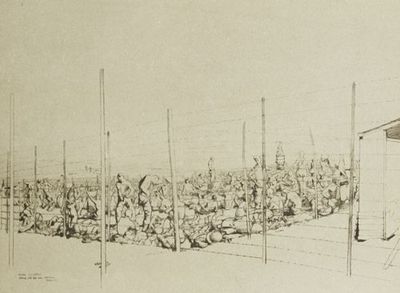
XIII. German Prisoners.
Thiepval Château, one of the largest in the north of France, was practically flattened. What little mound was left was covered with flowers. Some bricks had been collected from it and marked the grave of "An Unknown British Soldier." Even Albert, that deadly uninteresting little town, looked almost beautiful and cheerful. Flowers grew by the sides of the streets; roses were abundant in what were once back-gardens; a hut was up at the corner by the Cathedral and Daily Mails were sold there every evening at four o'clock, and the golden leaning Lady holding her Baby, looking down towards the street, gleamed in the sun on top of the Cathedral tower.
A family had come back from Corbie and re-started their restaurant—a father and three charming girls. They patched up the little house by the station and did a roaring trade, and some few other families came back. Once more a skirt could be seen, even a few silk stockings occasionally tripping about.
Péronne was now like a polished skeleton—very clean, but very brittle: a little breeze, and whole houses would tumble to bits. I started painting, one day, a little picture from the hall of the College for Young Ladies. When I went the next day I found my point of view had been raised several feet: the top walls (p. 038) had come down. But here again they had patched up a great big house as a club. It was airy, not intentionally so, but on a hot day it was ideal, with its view down over the Somme. Bully-beef pie, cheese and beer—if one could only have had French coffee instead of that terrible black mixture imported from England, things would have been more perfectly complete.
About August, a burial party worked round Thiepval. Lieutenant Clark was in charge of it, a sturdy little Scot. During the month or so they worked there, they dug up, identified and re-buried thousands of bodies. Some could not be identified, and what was found on these in the way of money, knives, etc., was considered fair spoil for the burial party.
Often, coming down Thiepval Hill in the evening, everything golden in the sunlight, one would come across a little group of men, sitting by the side of the battered Hill Road, counting out and dividing the spoils of the day. It was a sordid sight, but for a non-combatant job, to be a member of a burial party was certainly not a pleasant one, and I do not think anyone could grudge them whatever pennies they made, and most of them would have to go back in the trenches when their burial party disbanded.
Down in the Valley of the Ancre, just beside the Thiepval Hill Road, there was a great colony of Indians. They were all Catholics, and were headed by an old padre who had worked in India for forty-five years—a fine old fellow. He held wonderful services each Sunday afternoon on the side of the Hill in the open air; he had an altar put up with wonderful coloured draperies behind it, which hung from a structure about thirty feet high. In the mornings, it was a very beautiful (p. 039) sight to see these nut-brown men washing themselves and their bronze vessels among the reeds in the Ancre; one could hardly believe one was in France. And where was one? Surely in a place and seeing a life that never existed before, and never will again. The rapidity with which these Indians (they were a cleaning-up party) changed the whole face of Thiepval and that part of the Ancre Valley was incredible.

XIV. View from the Old English Trenches. Looking towards La Boisselle.
When working in the Valley of the Ancre region, coming home in the evening, we would bring the car down to the water near Aveluy. It is a long stretch of water, and the Tommies had put up a springboard. It was a joy to take off one's clothes in the car and jump into the cool water and watch all these wonderful young men stripping, diving, swimming, drying and dressing in the evening sun, all full of life and health. At one period, Joffroy, a very good French artist, who had lost a leg, right up to his trunk, early in the War, used to swim there with me. He had been a great athlete, and had a very strong arm-stroke, and possessed one of the most beautifully-developed bodies I have ever seen. One evening, after bathing, as we were driving back to Amiens in the car, he stretched out his arms and said, "Orpen, I feel like a young Greek god!" And, after a pause, added: "But only a fragment, you know, only a fragment." He was a great man, and could clamber over trenches with his wooden stump in a marvellous way.
I remember that summer a strange thing happened. One day I found, and started painting, the remains of a Britisher and a Boche—just skulls, bones, garments—up by the trenches at Thiepval. I was all alone. My faithful Howlett was about half a mile away with the car. When I had been working about a (p. 040) couple of hours I felt strange. I cannot say even now what I felt. Afraid? Of what? The sun shone fiercely. There was not a breath of air. Perhaps it was that—a touch of the sun. So I stopped painting and went and sat on the trunk of a blown-up tree close by, when suddenly I was thrown on the back of my head on the ground. My heavy easel was upset, and one of the skulls went through the canvas. I got up and thought a lot, but came to the conclusion I had better just go on working, which I did, and nothing further strange happened. That night I happened to meet Joffroy, and told him about these skulls, and how peculiar one was, as it had a division in the frontal bone (the Britisher's). He said he would like to go and make a study of it; so I brought him out the next morning to the place, I myself working that day in Thiepval Wood, about half a mile further up the hill. I left him, saying I would come back and bring him lunch from the car, as it was difficult for him to get about. When I did get back I found him lying down, not very near the place, saying he felt very ill and he thought it was the smell "from those remains." He had done no work, and refused even to try to eat till we got a long way away from the skulls. I explained to him that there was no smell, and he said, "But didn't you see one has an eye still?" But I knew that all four eyes had withered away months before. There must have been something strange about the place.
Most of these summer months John Masefield was working on the Somme battlefields. He preferred to work out there on the spot. He would get a lift out from Amiens in the morning on a motor or lorry, work all day by himself at some spot like La Boisselle, and walk back to the bridge at Albert and look out for a lift back to Amiens. If we worked out in this direction, on (p. 041) the way home our eye was always kept on the look-out for him; but really it never appeared to matter to him if he got back or not. I don't believe he minded where he was as long as he could ponder over things all alone.
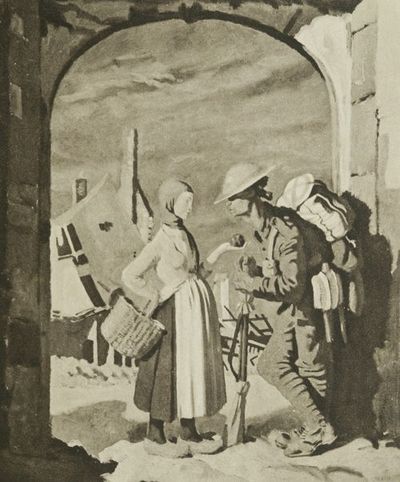
XV. Adam and Eve at Péronne.
The small towns and villages in this part of the country, behind the old fighting line of 1916, were, for the most part, dirty and usually uninteresting; but once clear of them the plains of Picardy had much charm and beauty, great, undulating, rolling plains, cut into large chequers made by the different crops. When a hill became too steep to work on, it was cut into terraces, like one sees in many of the vineyards in the South; these often have great decorative charm. A fair country—I remember Joffroy sometimes used the word "graceful" regarding different views in those parts, and the word gives the impression well.
There is a beautiful valley on the left, as one goes from Amiens to Albert: one looked down into it from the road, a patchwork of greens, browns, greys and yellows. I remember John Masefield said one day it looked to him like a post-impressionist table-cloth; later, white zigzagging lines were cut all through it—trenches.
In the spring of 1917 it was strange motoring out from Amiens to Albert. Just beyond this valley everything changed. Suddenly one felt oneself in another world. Before this point one drove through ordinary natural country, with women and children and men working in the fields; cows, pigs, hens and all the usual farm belongings. Then, before one could say "Jack Robinson!" not another civilian, not another crop, nothing but a vast waste of land; no life, except Army life; nothing but devastation, desolation and khaki.
About this time I got a telegram from Lord Beaverbrook asking me to meet him the next morning at Hesdin (Canadian Representatives' H.Q.); so I left Amiens early, arriving at Hesdin about 11.45 a.m. There they handed me a letter from him explaining to me that something very important had happened, and that he had left for Cassel. Would I have some lunch and follow him there? I lunched alone at the H.Q. and started for Cassel, where I arrived about 2.30, and found a letter telling me that he found that the aerodrome from which he wanted to get the news he desired was not near Cassel, so he had left, but would I meet him at the "Hôtel du Louvre," Boulogne, at 4 p.m., as his boat left at 4.20? Away I went to Boulogne, and walked up and down outside the "Louvre." About ten minutes past four up breezed a car, and in it was a slim little man with an enormous head and two remarkable eyes. I saluted and tried to make military noises with my boots. Said he: "Are you Orpen?" "Yes, sir," said I. "Are you willing to work for the Canadians?" said he. "Certainly, sir," said I. "Well," said he, "that's all right. Jump in, and we'll go and have a drink." So down to the buffet we went, and we had a bottle of champagne in very quick time, and away he went on to the boat, without another word, smiling; and the smile continued till (p. 043) I lost sight of him round the corner of the jetty. A strange day: I wondered a lot on the way back to Amiens, where I arrived about 9.45. I never knew then what a good friend I had met.
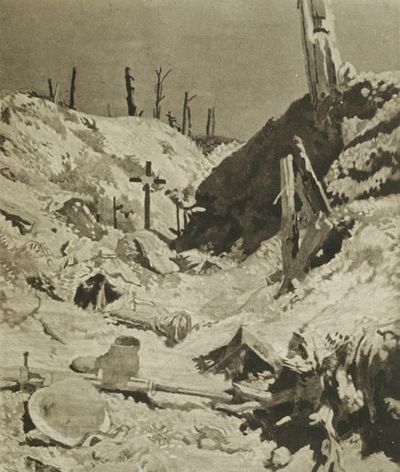
XVI. A Grave in a Trench.
As before, in Cassel, I first began to realise how wonderful the workwomen of France were, so in Amiens I began to realise how different the young men of France were to what one was brought up at home to imagine. I had always been led to believe that an Englishman was a far finer example of the human race than a Frenchman; but it certainly is not so now. The young Frenchman is a keen, strong, hardy fellow, and his general level of physical development is very high.
I remember this was brought home to me by having baths at Amiens. There was one bathroom in the hotel, and it contained a bath, but no hot water ran into it. So I told my batman to get hot water brought there in the mornings. The bathroom was on the first floor of the hotel, across on the other side of the courtyard from where I slept. The assistant cook, a man six feet odd high, and weighing about thirteen stone, a merry, jovial great giant, used to heat water for me and put it into an enormous bronze tub, which held a whole bathful; and he and my batman used to carry this upstairs; but if I happened to come along at the same time, this great man used to bend down and pick me up with his free hand and set me on his shoulder, and so to the bathroom.
One morning, about a year later, he told me he was going to leave. I asked him if he had got the "sack," or if he were leaving of his own free will. "Neither," said he. "I'm called up; I'm of age." This great, enormous man had only (p. 044) then reached the age of seventeen years. It amazed me. I remember a sad thing happened. When he left I gave him fifty francs and one hundred "Gold Flake" cigarettes. He had to go through Paris to get to his regiment, and when he arrived at the Gare du Nord they searched him, and found the cigarettes, took them from him, and fined him two hundred and fifty francs. It was a sad gift.
About this time I painted de Maratray—philosopher, musician, correspondent and clown.
Fane had gone, and Captain Maude was A.P.M. Amiens. Maude was a good A.P.M. His police were well looked after and adored him. He never wanted an officer or man from the trenches to get into trouble, but did his best to get them out of it when they were in it. Often have I been sitting at dinner with him at the "Hôtel de la Paix" and one of his police would come in and say, "A young officer is at the 'Godbert,' sir. He's had too much to drink, and is behaving very badly." Maude would curse loudly at his dinner being spoilt, but would always leave at once, and would calm down whatever young firebrand it was, find out where he had to go, and have him seen off by lorry or train to his destination. All this meant much more trouble for Maude than to have him arrested, and much less trouble for the culprit; but he always put them on their honour never to do it again; and many are the letters I have seen thanking him for being "a sport," and promising never "to do it again"; and asking would he dine with them the next time they got a night off? That was Maude's idea: he could not do too much for the men from the trenches, and they appreciated it. Maude was loved all through the North of (p. 045) France, except by a few rival A.P.M.'s. One could easily judge what his character was like from his favourite song:—
"Mulligatawny soup,
A mackerel or a sole,
A Banbury and a Bath bun,
And a tuppenny sausage roll.
A little glass of sherry,
Just a tiny touch of cham,
A roly-poly pudding
And Jam! Jam!! JAM!!!"
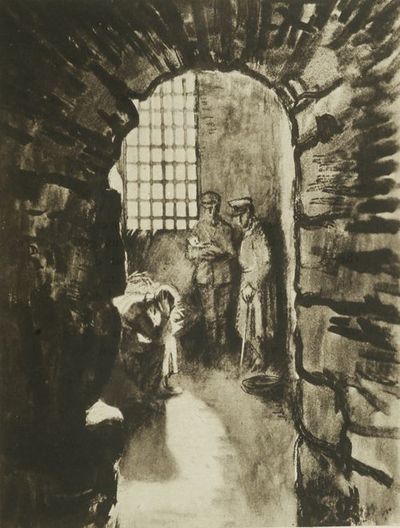
XVII. The Deserter.
A lot of nice people used to come to Amiens at that period; Colonel Woodcock and Colonel Belfield, the "Spot King," and Ernest Courage, "Jorrocks," in particular. It all became one large party at night for dinner. Maude was very popular with all the French officials, and great goodwill existed between the French and the British, and Marcelle's black eyes smiled at us from behind the desk, with its books, fruit, cheese and bottles; smiled so well that had she been different she might have out-pointed Marguerite as "Queen of the British Troops in Picardy." But no, her book-keeping and an occasional smile were enough for Marcelle, and she did them both exceedingly well.
Poor Marcelle! Afterwards I was told that when the Huns began to bomb Amiens badly she completely broke down and cried and sobbed at her desk. She was sent away down South, to Bordeaux, I think, and we never saw her again. It was sad. She was a sweet child, with her great dark eyes, and the little curl on her forehead, and her keen sense of the ridiculous.
The song of that time was:—
"Dear face that holds so sweet a smile for me.
Were it not mine, how 'Blotto' I should be."
But (p. 046) one night Carroll Carstairs of the Grenadier Guards breezed into Amiens, bringing with him a new American song which became very popular. The chorus ran something like this:—
"When Uncle Sam comes
He brings his Infantry;
He brings Artillery;
He brings his Cavalry.
Then, by God, we'll all go to Germany!
God help Kaiser Bill!
God help Kaiser Bill!
God help Kaiser Bill!
"For when Uncle Sam comes...." (Repeat)
One day Maude asked me to go to the belfry, the old sixteenth-century prison of Amiens, a beautiful building outside, but inside it was very black and awe-inspiring. The cells, away up in the tower, with their stone beds and straw, rats and smaller animals, made one's flesh creep. I am sorry I never painted the old fat lady who kept the keys in the entrance hall, a black place, lit by an oil lamp which hung over the stone fireplace. I put off painting her and her hall then for some reason, and later she was killed by a shell at the door during the bombardment. Here in the belfry the deserters were put, in an endeavour to make them say who they were, and Maude asked me to go this day because he had an interesting case.
A young man in a captain's tunic had been found in a brothel, and his papers were very incomplete. He had no leave warrant. They found he had been living at the "Hôtel de la Paix" for about a week. He had come to Amiens on a motor-bicycle, which he left in the street. They telephoned to the "Captain's" regiment and found the "Captain" was with his (p. 047) unit, but a tunic had been stolen from him at Calais. They also found a motor-bicycle had been stolen from Calais, and that it corresponded in number with the one found in the street.
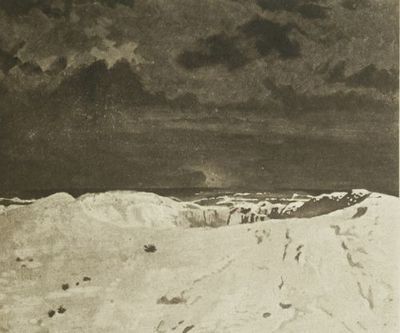
XVIII. The Great Mine. La Boisselle.
We were given a candle, and climbed the black stairs to his cell. The youth was in a bad state, sobbing. Maude told him how sorry he was for him, and asked him not to be a fool, but to tell him the truth, and he would have him out of that place at once. He agreed, and told a long story, or rather—another long story. This was his third day and his third story, and it turned out there was not a word of truth in this one either.
He was one of the best-looking young men I ever saw, tall, clean-cut and smart-looking. The next day Maude found out that most of his tears were due to the fact that he was very badly diseased, and of course, without any treatment, was getting worse daily. Maude could not stand this, so he sent him to the hospital for treatment, from which the youth promptly escaped, and was not found again for ten days. They knew some one must have been hiding him, probably a woman; which proved right. In ten days he was found, plus forty pounds, which the lady had given him.
Maude gave him one more twenty-four hours' chance in the belfry; but it was no good, only more lies. So he was sent to Le Havre, where I believe no deserter has ever lasted more than forty-eight hours without telling the truth and nothing but the truth. I presumed that after that he was shot. The only thing I learnt for certain, was that he was a Colonial private. Some time later I used to go very often to a little restaurant in Paris, and became friends with one of the head waiters. He said a customer had come in, giving the name of Lord X——, and had engaged a table for dinner. He evidently had some doubt about Lord X——, and asked me if I would know (p. 048) him if I saw him. I said, "Certainly," as the name given was that of the son of one of the best-known Earls in England. In he came for dinner, a very good-looking man, wearing the Légion d'Honneur. Lord X——, the deserter of the belfry!
The great mine at La Boisselle was a wonderful sight. One morning I was wandering about the old battlefield, and I came across a great wilderness of white chalk—not a tuft of grass, not a flower, nothing but blazing chalk; apparently a hill of chalk dotted thickly all over with bits of shrapnel. I walked up it, and suddenly found myself on the lip of the crater. I felt myself in another world. This enormous hole, 320 yards round at the top, with sides so steep one could not climb down them, was the vast, terrific work of man. Imagine burrowing all that way down in the belly of the earth, with Hell going on overhead, burrowing and listening till they got right under the German trenches—hundreds and hundreds of yards of burrowing. And here remained the result of their work, on the earth at least, if not on humanity. The latter had disappeared; but the great chasm, with one mound in the centre at the bottom, and one skull placed on top of it, remained. They had cut little steps down one of its sides, and had cleared up all the human remains and buried them in this mound. That one mound, with the little skull on the top, at the bottom of this enormous chasm, was the greatest monument I have ever seen to the handiwork of man.
There was another fairly large mine here, just by the Bapaume Road, and there was a large mine at Beaumont-Hamel, and also the "Cough-drop" at High Wood. These were wonderful, but they could not compare in dignity and grandeur with the great mine of La Boisselle.
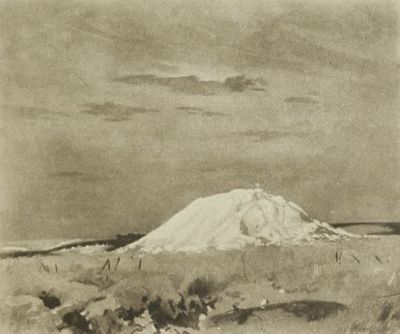
XIX. The Butte de Warlencourt.
Working (p. 049) out on the Somme, in the evenings as the sun was going down, one heard constantly a drone of aeroplanes, which quickly grew louder and louder, and before one could think, two of these great birds would pass just over one's head, quite close to the ground. A couple of minutes later, Bang! bang! bang! bang! and the boom and crash of the guns. Presently you would see the two birds, high up, returning to their aerodrome. They had gone up to the Boche trenches, in the eye of the sun, machine-gunning them and dropping small bombs.
The Butte de Warlencourt looked very beautiful in the afternoon light that summer. Pale gold against the eastern sky, with the mangled remains of trees and houses, which was once Le Sars, on its left. But what must it have looked like when the Somme was covered with snow, and the white-garmented Tommies used to raid it at night? It must surely have been a ghostly sight then, in the winter of 1916.
About this time I went to Paris several week-ends at odd times and painted for the Canadians Generals Burstall, Watson and Lipsett, also Major O'Connor. Poor Lipsett was killed by a shell later. He was a thoughtful, clever, quiet man, and was greatly respected. Burstall was a great, bluff, big, hearty fellow, and Watson was a fine chap, a real "sport." O'Connor was A.D.C. to General Currie, and had been twice wounded.
Paris! What a city!
"Paree!
That's the place for me.
Just across the sea
From Dover!"
About this time, the C.-in-C. was granted the Order of a Knighthood of the Thistle. It was given to him by the King during his visit to France in a château at Cassel. No one was present when he received this honour. Just afterwards I did a little interior of the room.
General Trenchard and Maurice Baring chose out two flying boys for me to paint, and they sat to me at Cassel. One was 2nd Lieutenant A. P. Rhys Davids, D.S.O., M.C., a great youth. He had brought down a lot of Germans, including two cracks, Schaffer and Voss. The first time I saw him was at the aerodrome at Estre Blanche. I watched him land in his machine, just back from over the lines. Out he got, stuck his hands in his pockets, and laughed and talked about the flight with Hoidge and others of the patrol, and his Major, Bloomfield. A fine lad, Rhys Davids, with a far-seeing, clear eye. He hated fighting, hated flying, loved books and was terribly anxious for the war to be over, so that he could get to Oxford. He had been captain of Eton the year before, so he was an all-round chap, and must have been a magnificent pilot. The 56th Squadron was very sad when he was reported missing, and refused to believe for one moment that he had been killed till they got the certain news. It was a great loss.
The other airman chosen was Captain Hoidge, M.C. and Bar—"George" (p. 051) of Toronto. Hoidge had also brought down a lot of Germans. His face was wonderfully fitted for a man-bird. His eyes were bird's eyes. A good lad was Hoidge, and I became very fond of him afterwards. I arranged with Maurice Baring and Major Bloomfield that Hoidge was to come to Cassel one morning at 11 a.m. to sit to me. The morning arrived and 11 o'clock and no Hoidge. Eleven-thirty, 12—no Hoidge. About 12:30 he strolled into the yard and I heard him asking for me in a slow voice. I was raging with anger by this time. He came upstairs and I told him there was no use doing anything before lunch, and that we had better go down and get some food. We ate silently. I could see he was rather depressed. About halfway through our meal, he said: "I'm lucky to be here with you this morning!" "Why?" said I. "Oh," he said, "I made a damned fool of myself this morning. Let an old Boche get on my tail. Damned fool I was—with my experience. Never saw the blighter. I was following an old two-seater at the time. He put a bullet through the box by my head, and cut two of my stays. If old B. hadn't happened to come up and chased him off I was for it. Damned fool! But the morning wasn't wasted, afterwards I got two two-seaters." I said: "Do you realise you have killed four men this morning?" "No," he said, "but I winged two damned nice birds." Then we went upstairs and he sat like a lamb.
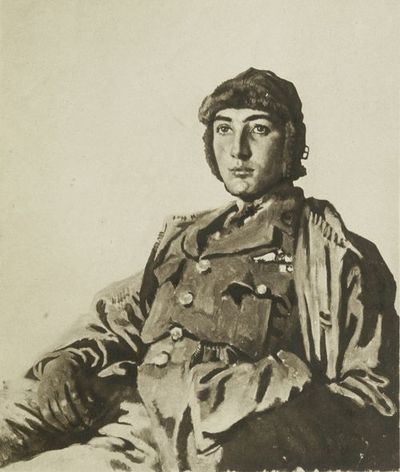
XX. Lieut. A. P. F. Rhys Davids, D.S.O., M.C.
One evening, during the King's stay at Cassel, I was working in my room about 7 o'clock, when a little scrap of paper was brought me on which was written, "I am dining downstairs.—M. B." I went downstairs and there was Maurice Baring, and, with luck for me, alone. We had a great dinner. He was in his best form; for after dinner we went up to my room (p. 052) and sat by the open window and talked and talked. Suddenly Maurice stopped, and said: "What's that noise?" "What noise?" said I. So we looked down into the courtyard—only about ten feet—and there was "Boom," who had been dining with the King, and Philip Sassoon. "What the devil are you two doing?" said "Boom." "We've both been shouting ourselves hoarse for ten minutes. It's the last damned time you dine with Orpen, Maurice!" It's true we never heard them—but then Maurice was talking.
One morning, when the wind was very fresh, I got a telephone message from Major Bloomfield telling me to come to the squadron at once and see some "crashes." It was a glorious morning, blue sky, with great white clouds sailing by. I got down to the squadron as quickly as I could. A whole lot of novices from England had been sent out on trials, and the Major expected "great fun" when they landed.
The fire was made big and a great line of blue smoke whirled down the aerodrome to give the direction of the wind. Presently they began to come back. Some landed beautifully—one in particular—and the Major said to me: "Come on, I must go and congratulate that chap," and started running for the machine. When we got closer, he stopped and said: "Damn it! it's Hoidge, I forgot he was out."
I remember one poor chap in particular. He circled the aerodrome twelve times, each time coming down for a landing and each time funking it at the last moment. At last he did land, two or three bumps, and then—apparently slowly—the machine's nose went to the ground and gracefully it turned turtle. "Come along," said the Major, and when we got to the machine the wretched pilot was getting out from under it. "You unspeakable creature," said the Major. "Don't let me see (p. 053) your face again for twenty-four hours." And away limped the "unspeakable creature," covered with oil and dirt. I must add that after lunch the Major went up to him and patted his back and said he hoped he felt none the worse. But the thing that amazed me was, that although the machine seemed to land so gently, the damage to it was terrific—propeller and all sorts of strong things smashed to bits.
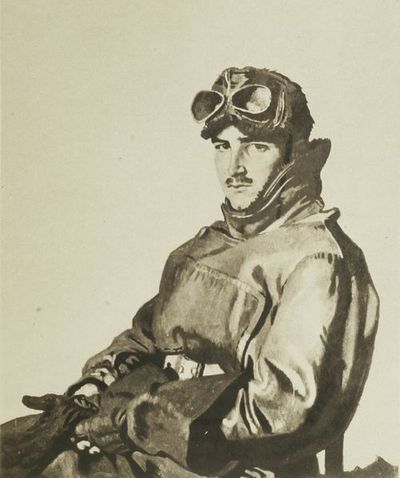
XXI. Lieut. R. T. C. Hoidge, M.C.
Ping-pong was the great game at this squadron (56th), and I used to play with a lot of them, including Hoidge and McCudden, but I did not know the latter's name at that time. It was before he became famous.
One day I went there with Maurice Baring, and the Major was greatly excited because they had just finished making a little circular saw to cut firewood for the squadron for the winter. The Major had a great idea that, as the A.D.C. to "Boom" was lunching, after lunch there would be an "official" opening of the circular saw. It was agreed that all officers and men were to attend (no flying was possible that day) and that Maurice should make a speech, after which he was to cut the end of a cigar with the saw, then a box was made with a glass front in which the cigar was to be placed after the A.D.C. had smoked a little of it, and the box was to be hung in the mess of the squadron. It was all a great success. Maurice made a splendid speech. We all cheered, and then the cigar was cut (to bits nearly). Maurice smoked a little, and it was put safely in its box. Then Maurice was given the first log to cut. This was done, but Maurice was now worked up, so he took his cap off and cut this in halves. He was then proceeding to take off his tunic for the same purpose, but was carried away from the scene of execution by a cheering crowd. It was a great day. I remember Maurice saw me back to Cassel about 1 a.m., (p. 054) after much ping-pong and music. "I'll go back to the shack where the black-eyed Susans," etc., was the song of the moment then in the squadron.
Shortly after this Major Bloomfield was ordered home, promoted and, I think, sent to America. At this loss, a great gloom fell over the 56th Squadron. I never saw any squadron in France that was run nearly so well as the 56th under Bloomfield, nor any Major loved more by his boys.
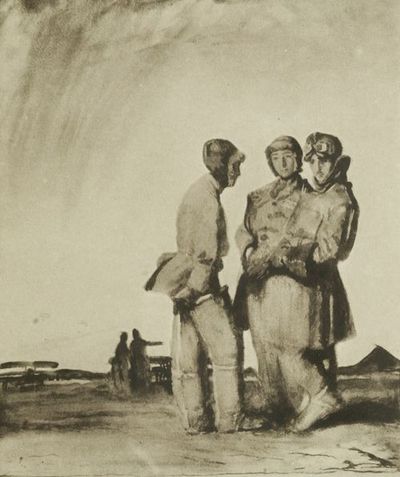
XXII. The Return of a Patrol.
About this time I went to Paris and met several Generals and Mr. Andrew Weir (now Lord Inverforth), and it was arranged that Aikman was to go home to the War Office and that I, perhaps, might have my brother out later to look after me. Aikman left, and I was very lonely. A better-hearted companion and a kinder man one could not meet, and regarding the intricacies of "King's Regulations" and such-like things, he was a past master.
After this, whenever I went to Paris, the great thing was to stop on the way at Clermont and lunch with "Hunchie." "Hunchie" kept the buffet at the station. He had a broken back and had been a chemist in Paris, but said he had come to the station at Clermont for excitement. It was so exciting that Maude proposed stopping there for a rest cure! But "Hunchie's" lunches were excellent. I remember one day on my way to Paris, I asked him at lunch if he had any Worcestershire Sauce; he had not. He asked me when I was coming back North again. I said the next day, which I did, and stopped for lunch. He had the sauce. He had been to Paris to get it. "Hunchie" was a wonder, so was Madame, and so was their dog "Black."
One spot in Paris, the Gare du Nord, will always mean a lot to the British Army on the Western Front. What sights one saw there!—masses of humanity, mostly British officers and men, (p. 056) each with their little "movement order": there they were in the heart of the Gay City. Yet that little slip of paper would, in a couple of hours, send them to Amiens, and a little later they would be at the front suffering Hell. Laboreur did a wonderful etching of an officer bidding farewell to his wife at the Gare du Nord. It gave the whole tragedy of the place—the blackness, smoke, smell and crush. There, any night during an air raid, one could not help thinking what would happen if the Boche got a bomb on the Gare, with its thousands of fighting men all jambed together under its glass roof in the semi-darkness. What a slaughter! And yet through it all, if the old Gare could only speak, it could tell some strange and amusing tales of that time—tales that would make one laugh, but with the laughter there would be a catch in the throat and a swimming in the eyes. It is extraordinary how funny sometimes the most tragic things can be.
The weather had become very bad and cold, and I worked on all impossible out-of-door days in my room in the "Hôtel de la Paix," which was known as the "Bar." My only rule was that the "Bar" was not open till 6.30 p.m. At times it nearly rivalled "Charlie's Bar." At what hour the "Bar" closed I was not always certain, as, no matter who was there, at about 10:30 I used to undress and go to bed, and so accustomed did I get to the clink of glasses and the squirt of the syphons that I slept calmly through it all. Among the regular attendants when in Amiens were Captain Maude, "Major" Hogg, Colonel MacDowall of the 42nd G.H., Colonel Woodcock, Colonel Belfield (the Spot King), Captain Ernest Courage (Jorrocks), Captains Hale and Inge (then of the Press), Bedelo (Italian correspondent), and Captain Brickman—a merry lot, taking them all round, and that room heard some good stories; some (p. 057) may have been not quite nice, but none were as dirty or disreputable as the room itself, with its smell of mud, paint, drink, smoke, and the fumes from the famous "Flamme Bleue" stove. The last man to leave the bar had to open the window. This was a firm rule. It sometimes took the last man a long time to do it, but it was always done.
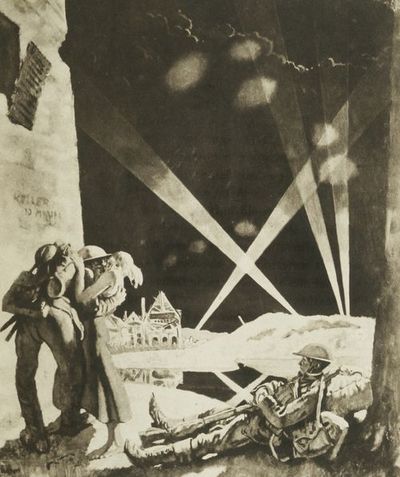
XXIII. Changing Billets.
By this period of the war nearly every French girl could speak some English, and great was their anger if one could not understand them. I remember a very nice girl, who worked at the "Hôtel de la Paix," came to me one day and said solemnly, "My grandfadder he kill him." "Gracious!" I said, "whom did he kill?" "He kill him," was the furious reply. Apparently the poor grandfather, living under German rule at Landrecies, had committed suicide.
I went back to Cassel and began to itch, mildly at first, and I was not in the least put out. My brother came to France, and I went to Boulogne to meet him. His boat was to arrive at 6.15 p.m., but did not get in till just 10 p.m. They had been away down the Channel avoiding something. Driving back to Cassel we had a fine sight of bombing and searchlights. Hardly a night passed at this period that the Boche did not have a "go" at St. Omer. One night, just then, they dropped three torpedoes in Cassel as we were having dinner, but Suzanne, the "Peach," at her desk, never fluttered an eyelid. I believe afterwards, during the summer of 1918, when things were quite nasty at Cassel, she never showed any signs of being nervous: just sat at her desk, made out the bills, and occasionally made some lad happy by a look and a smile.
On some evenings we used to give great entertainments in the kitchen of the "Sauvage." I would stand the drinks, and Howlett (my chauffeur) played the mouth-organ, and Green (my batman) (p. 058) step-danced. It was an amusing sight watching the expressions of those old, fat Flemish workwomen of the hotel.
The itching got worse, so one wet, black evening I went to see the M.O., took off my clothes in a dirty, cold, dark room, and he examined me carefully with the aid of an oil lamp. "You've got lice," he said. "Really?" said I. "Have you got a servant?" "Yes," said I. "Well, go back and give him Hell, and tell him to examine your clothes." I asked him about my foot, which had a hole in it about the size of a sixpence. "That's nothing," said he. "Keep it clean." So back I went, down the black cobbled street, called up my faithful boys, Howlett and Green, and told them I was lousy. I took my clothes off, and they examined them with electric torches and candles and oil lamps. Not a thing could they find. "Do you mind my looking at you, sir?" said Howlett. So he had one look. Said he, "If it were lice got you into that state, you'd be crawling with them."
I stood the pain and itching another couple of days, and sent for the M.O. to come to me. As there was more light in my room, he came and had a look. "Ah!" said he, "I thought last time it might have been that: you've got scabies. You must leave here for X—— in the morning, and have all your bed-clothes sent round to me before you leave."
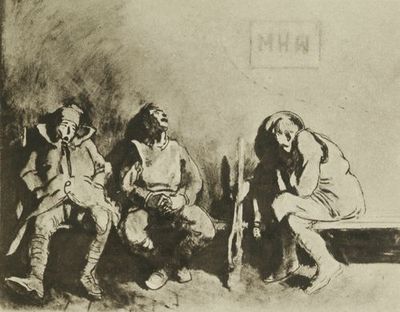
XXIV. The Receiving-room: 42nd Stationary Hospital.
In the morning I broke the news gently to Madame that I was a "dirty dog," and that my bed must go for a bit to be purged, and went round to the A.P.M. to say good-bye. When I told him where I was being sent, he said, "That place! Don't you do it. I was waiting there the other day to see someone, and I counted ten bugs on the wall." That put the wind up me, so I wrote to the M.O. and said I had an important (p. 059) meeting at Amiens that evening at 6 p.m., and that I would report at the X—— hospital immediately after that. He seemed rather hurt at my getting out of his reach, but he let me go (as I mentioned having to see the C.-in-C. on the way. It was wonderful what the mention of the C.-in-C. did for one!). He gave me my slip for the hospital:
"Herewith Major Orpen, suffering from scabies. Please...."
and with this I departed for Amiens, where I reported to the Colonel of the X—— Hospital. Over a whisky-and-soda I gave him the "slip," and he looked at my arm and said, "Yes, scabies," and I was put into the isolation ward and treated for this disease. How more people did not die in that hospital beats me. I personally never got any sleep, and left in a fortnight nearly dead. Lights were out at 10 p.m. This sounds good, but there were about eight of us in the ward. I had to have my foot treated every three hours. The man in the next bed to mine was treated for something every two hours; and nearly all the other beds were treated three or four times during the night. For all these treatments the lights blazed about twenty times each night, and some of the treatments were very noisy. At 6.30 a.m., in the dark, the nurse came round, and anyone who was not dying was turned out of bed. Why, I know not: there was no heat in the place. If you were well enough you went off to a soaking sort of scullery and heated some water over a gas-jet and shaved. If you were not well enough, you sat in your dressing-gown on a chair. You were not allowed to sit on your bed. At 8 a.m. you were given an extraordinarily bad breakfast—porridge with no (p. 060) milk, tea with no sugar, bread with—most days—no butter. After breakfast you could go to bed again, but this was not allowed if you were going to be let out during the day, as I was most of the time. So there you sat again, freezing, till an orderly came and said your bath was ready, usually about 9.30 a.m.—three hours after you had left your bed. The bath was in an outhouse about fifty yards across the yard from the ward. In hail, rain or snow, you had got to go there. In it I was boiled in a bath, scrubbed all over with a nail-brush, and then smothered all over with sulphur—wet, greasy, stinking sulphur rubbed in all over me. I dressed by putting on a pair of pyjamas first. These more or less kept this grease from getting through to my other clothes, and I was allowed out to work—a sick, freezing, wet individual. But my room at the "Hôtel de la Paix" was warm, and I sat over my "Flamme Bleue" all the morning. After I had been treated with sulphur for "scabies" a couple of weeks, a hole came in my throat just like the one I had on my foot—a white hole with a black band round it, and all the flesh for about six inches beyond it a deep scarlet. One morning the boy who washed me said: "I beg your pardon, sir, but what are you being treated for?" "Scabies," said I. Said he: "Don't say I said so, sir, but show the M.O. that thing on your neck. You haven't got scabies, and this sulphur will kill you soon." So I waited for the M.O. till he did his rounds. When he came to me he said the usual, "Everything all right with you?" "No," said I. "I've got a scabie on my neck that is worrying me." So he had a look at it and said: "I don't think this treatment is doing you much good. I shall get you dismissed from the hospital to-day." So I was chucked (p. 061) out. I happened to have blood-poisoning, not scabies, and I have it still. During the time I was in hospital, I got four very amusing poems from a General at G.H.Q. They were the bright spots during those days. I am sorry they are too personal to print.
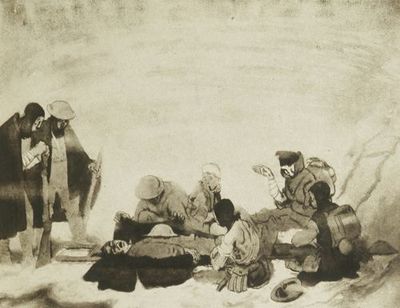
XXV. A Death among the Wounded in the Snow.
About this time an officer told me a good story about my friend, Carroll Carstairs. The Cambrai battle was on, and the Grenadier Guards were advancing through a village. Carroll was with a brother officer, and said suddenly, "Look at the shape of that church now! Isn't it magnificent?" Another shell shrieked and hit the structure, and he said, "Damn! the fools have spoilt it." I believe it was during this battle he earned the M.C.
My brother became very popular with those he met in France. Too popular, indeed, with the girls in the hotel at Amiens to please Maude or myself. Maude and I used to complain about it. Maude would say, "William, here you and I have been slaving for months to make ourselves liked by these girls, and your blinking little brother comes along, and cuts us out in a few days. It's disgusting." It was true: Maude, the A.P.M., and I, "le petit Major," took a back seat. We worked hard to prevent it, my brother did nothing: he kept silent, laughed, and won. It was very sad, and we were much upset.
Christmas came with much snow and ice. Maude and I went to dinner at Captain MacColl's mess in the Boulevard Belfort. Maude remarked once, "MacColl is the only intelligent Intelligence Officer I know." We had a great dinner, and at 10 p.m. Maude and I went, in a blinding snowstorm, to the police concert. I'll never forget the fug in that place: it reeked of sweat, drink, goose and fags. They were all very happy, these huge men; all singing the saddest songs they could think of, including, of course, "The Long, Long Trail." American police were there also. They had come to Amiens to learn their job. We left late, but we had promised to return to MacColl's mess, so started for there, but after we had fallen in the snow a few times, we gave the idea up and went to bed.
About this time I went to H.Q. Tanks, and painted the General and Hotblack, and had a most interesting time. General Elles was a great chap, full of "go," and a tremendous worker. Hotblack, mild and gentle, full of charm; one could hardly imagine he had all those D.S.O.'s, and wound stripes—Hotblack, who liked to go for a walk and sit down and read poetry. He said it took his mind off devising plans to kill people better than anything else.
Then there was the "Colonel" of the Tanks—"Napoleon," they called him. A great brain he had. Before the war he knew his Chelsea well, and the Café Royal and all the set who (p. 063) went there. And there was a dear young Highlander also, a most gentle, shy youth. He was very happy one day; he had a "topping" time. He was out with the Tanks, and he killed a German despatch-rider and rode home on his bicycle.
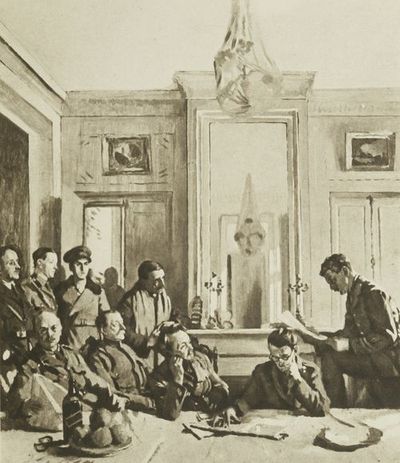
XXVI. Some Members of the Allied Press Camp.
One morning when I was painting the General, he told me that my old "Colonel" from G.H.Q. was coming to lunch. I hadn't seen him since he sent the telegram, "When do you return?" When he arrived we were all in the hall, but he didn't take the slightest notice of me. Presently, we went in to lunch. He sat opposite to me, and about halfway through the meal, he said, "Hello, Orpen! I didn't see you before." To which I replied, "You have the advantage over me, sir. I don't remember ever having seen you before." It was no good. We would never have made good friends.
I regret that one night, while I was staying at G.H.Q. Tanks, I got "blotto." It wasn't altogether my fault, people were so hospitable. It was a night when I dined with General Sir John Davidson, "the Poet," at G.H.Q. I left "Tanks" on a bitterly cold, wet evening, and called at the Canadian château at Hesdin. I found them all sitting round a big fire. It was tea-time. The Colonel, who saw I was cold, gave me a whisky-and-soda, which he repeated when I left. I then went on to the C.-in-C.'s château to see Major Sir Philip Sassoon, and found him in his hut outside the château. As soon as I sat down he rang his bell. The orderly came. "A whisky-and-soda for Major Orpen," said he. This came. When I had got through about half of it, his telephone rang. "Run upstairs, Orp," said he, "and see Allan (Colonel Fletcher), he's laid up in bed." (p. 064) So off I went and found his bedroom. As soon as I came in he rang his bell. His servant came. "Whisky-and-soda," said he. When I was about halfway through this, there were footsteps on the stairs. "That's the Chief coming," said the Colonel. "Gosh!" said I, and I pushed my whisky-and-soda well under the bed. In came the C.-in-C. "Hello, little man!" said he, "you look cold; and they don't seem to be very hospitable to you here, either." He rang the bell. The orderly came. "Bring Major Orpen a whisky-and-soda," said he. That did it. He talked for about ten minutes, and left. And in came Philip with my half-finished drink, cursing. "I've been standing on those damned stairs with Orp's drink for the last half-hour waiting for the Chief to leave." So, of course, I had to finish it. And then the Colonel's. And I went off to General Davidson's, and he had a nice cocktail ready for me, and a good "bottle" for dinner—after which I do not remember anything. But it was a bit of bad luck, one thing happening after another like that.
When I went back to Amiens I saw a good bit of the Press. The "Major" had gone, and Captain Hale of the Black Watch had charge. A fine fellow, Hale, as brave as a lion. He told endless stories, which one could hardly ever understand, and he laughed at them so much himself that he usually forgot to finish them. Rudolf de Trafford was there, and old Inge, a much-travelled man; also Macintosh, a Parisian Scot. It was very peaceful; no one dreamt that shells were soon to come crashing through that old château. Ernest Courage, with his eyeglass fixed in his cap, used to come into Amiens and finish lunch with his usual toast, and then sing Vesta Tilly's great old song:—
"Jolly
(p. 065)
good luck to the girl who loves a soldier.
Girls, have you been there?
You know we military men
Always do our duty everywhere!
"Jolly good luck to the girl who loves a soldier.
Real fine boys are we!
Girls, if you want to love a soldier
You can all (diddley-dum) love me!"
and very well he did it.
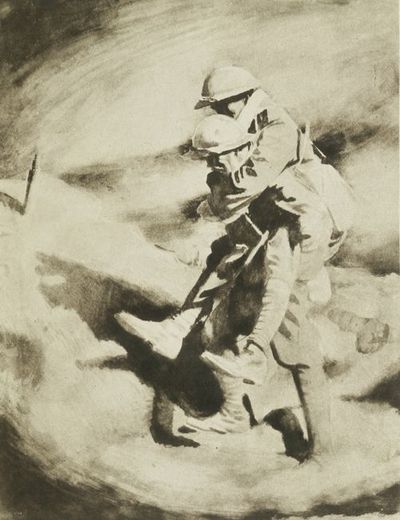
XXVII. Poilu and Tommy.
General Seely asked Maude and myself to dine one night at the "Rhin." Prince Antoine of Bourbon was there—he was Seely's A.D.C. During dinner I arranged to go to the Canadian Cavalry H.Q. and paint Seely, which I did, and had a most interesting time. Munnings was painting Prince Antoine at this period, on horseback. He used to make the poor Prince sit all day, circumnavigating the château as the sun went round. I remember going out one morning and seeing the Prince sitting upon his horse, as good as gold. Munnings was chewing a straw when I came up to them. "Here," said he. "You're just the fellow I want. What colour is that reflected light under the horse's belly?" "Very warm yellow," said I. "There! I told you so," said he to the Prince. Apparently there had been some argument over the matter. Anyway, he mixed a full brush of warm yellow and laid it on. Just before lunch I came out again. There they were in another spot. "Hey!" said Munnings, "come here. What colour is the reflection now?" "Bright violet," said I. "There! what did I tell you?" said he to the Prince; and he mixed a brush-load of bright violet, and laid it on.
As the sun was sinking I went out again, and there was the poor Prince, still in the saddle. Munnings had nearly as much (p. 066) paint on himself as on the canvas. He was very excited. I could see him gesticulating from a distance. When he saw me he called out: "Come here quickly before the light goes. What colour is the reflection on the horse's belly now?" "Bright green," said I. "It is," said he, "and the Prince won't believe me." And he quickly made a heap of bright green and plastered it over the bright yellow and bright violet reflections of the morning and midday. So ended the day's work, and the bright green remained in full view till the next sitting.
The day I arrived Munnings was much upset because he had no sable brushes. He was telling me about this, and said, "Do you mind my asking you three questions?" "Not at all," said I. "First," he said, "have you got a car?" "Yes," said I. "Second," said he, "have you got any sable brushes?" "Yes," said I. "Third," said he, "will you lend me some?" "Yes," said I, and handed him over all I had. When I was leaving I said to Munnings, "What about those sable brushes, Munnings?" He replied: "Don't you remember I asked you three questions?" "I do remember your asking me something," said I. "Well," said he, "the first question I asked was, 'Have you got a car?'" "What the hell has that got to do with my sable brushes?" said I. "A great lot," said he. "You can damn well drive to Paris and get some more for yourself. I haven't a car."
About a week later I painted the Prince. He was a most devoted A.D.C. to the General. It was very sad his getting killed afterwards.
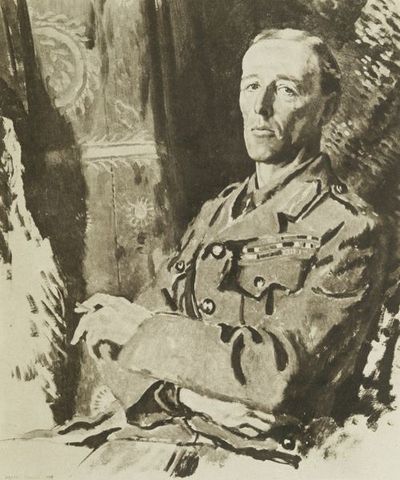
XXVIII. Major-General the Rt. Hon. J. E. B. Seely, C.B., etc.
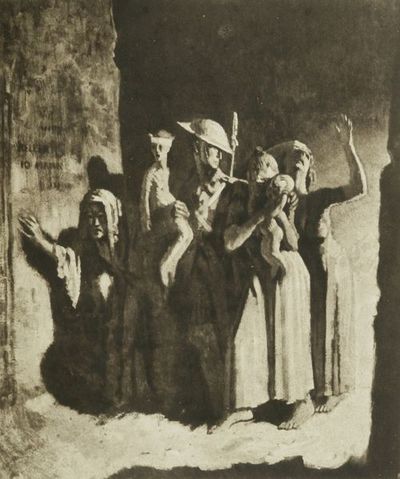
XXIX. Bombing: Night.
I was now ordered back to London—I forget what for, something about expenses, I think. Lord Beaverbrook had become my boss, and they were going to pay all my expenses. It was a nice thought, but they never did.
I went with my brother up to G.H.Q. on March 20th to get warrants from Major A. N. Lee, D.S.O., and went on to Boulogne, and there met Ian Strang, who dined with us at the "Morny." There was a raid on when we came out from dinner, and people wished us to take shelter; but we had dined very well. The next morning there was a thick mist low down, with a clear sky above. When I got on the boat I met General Seely, who introduced me to General Sir Arthur Currie, who said: "You used to billet at St. Pol, usedn't you?" "Yes, sir," said I. "Well," said he, "I have just come through it. They got seven fourteen-inch shells into it this morning." "Has the offensive started?" said I. "That's about it," said he.
London seemed very strange to me at first. I felt very out of things.
Nobody I met, except the soldiers, or those who had been to France like myself, seemed to have any thoughts in common with mine: they did not appear to want to think about the fighting man or of the colossal deeds that were being done daily and nightly on the several fronts. No, they (p. 068) all talked of their own war-work. Overworked they were, breaking up—some at munitions; some at shoemaking classes; others darning socks—and they were all suffering terribly from air raids. In fact, to put it in a few words, they were well in the middle of the world war; they were just the same as the fighting man in France or on some other front.
Then it was that the definite thought came to me: the fighting man, the Hero, will be forgotten; that the people of England who have not been "overseas" and seen them at work, would never realise what these men have been through—win or lose, they would never know.
Their constant talk was of the terrible things they at home were going through on air-raid nights. It hurt me—their complaining about their little chances of damage, when I knew that millions of men were running a big risk of being blown into eternity at any moment, day or night. It is true, my first visit home made me realise that the fighting man after the war would be ignored, and I knew the reason—"Jealousy." I had been given the chance of looking on, and I had seen and worshipped. But if I had not seen, I might have felt just the same as those who stayed at home. Jealousy is one of the strongest things the human mind has to struggle against. Even now, after joint victory, it is one of the things the Allied nations have to guard against, for it exists between them, but surely the bond of the dead, that great community:—
"The Chosen Few,
The very brave,
The very true,"
French, British, Belgian, Italian, Portuguese and American, surely (p. 069) they should be enough to hold us together in love and respect, without jealousy, or any envy, hatred or malice in our hearts!
It was decided that an exhibition of my stuff should be held, so photographs had to be taken of each little thing, a title given to each, and the whole bunch sent to G.H.Q. for Major Lee to censor, which he did, refusing to pass nearly all of them. But General MacDonough, however, squashed all that. Then one of my titles got me into trouble. My first "Colonel's" set had been waiting all the year to get something against me, and now they worked up a molehill to a mountain. I had to go constantly to the War Office, and I was talked to very severely. In fact, I was in black disgrace. My behaviour could not have been worse, according to Intelligence (F), or whatever they were then called at G.H.Q.
I was lunching with Maurice Baring at the "Ritz" one day, and he told me McCudden was in London. I said I would like him to sit. "Well, write and ask him," said Baring. "But," said I, "I don't know him." "Right," said Baring, "I'll write to him." The thing was arranged, and one morning I heard a cheery voice below and someone came bounding upstairs, and before I saw him he shouted: "Hello, Orps! Have you a ping-pong table here?" He was the little unknown boy at the 56th Squadron with whom I used to play ping-pong only a few months before. Now he was the great hero, Major McCudden, V.C., D.S.O., etc., and well he wore his honours, and, like all great people, sat like a lamb.
The news one got in those days was terrible—one could not realise it—it seemed utterly impossible. Péronne taken! Bapaume (p. 070) taken! The Huns were back over the old Somme battlefields; they had taken Pozières; the great American stores there had gone; they were back over the great mine of La Boisselle. Terrible! And the golden Virgin had fallen from the Cathedral tower, and one remembered the old prophecy, "When the Virgin of Albert falls from her tower the end of the war is at hand," and now she was down in the dirt of the street. Did it mean defeat? Amiens was being shelled, the Boche swarmed on the heights of Villers-Bretonneux, and they could see clearly that great landmark of Picardy, Amiens Cathedral.
The railroad from the North to Paris was smashed, and they very nearly destroyed the great railway bridge near Etaples—great masses of masonry were blown out of it—everything was bombed right back to the sea. Then the Huns turned South. On they rushed—Montdidier shelled, Clermont in danger, on they went to Soissons and Château Thierry. One Sunday news came to the War Office that Paris had been bombed all day. A few minutes later this was corrected to "Paris has been shelled all day." It was awful! unbelievable! Paris shelled! Where had the Huns got to? Was the prophecy true of the Virgin falling from her tower? Were the Allies beaten? All the towns in Germany were ringing their victory bells, and we had our backs to the sea. It was a black period.
The afternoon my exhibition opened, they sent a message for me to go to the War Office immediately. There a Colonel showed me a minute from Intelligence (F), G.H.Q. My former Colonel's followers had really put their backs into it this time. They got me fairly and squarely. The Daily Express (I think it was Lord Beaverbrook's little joke) published a supposed interview (p. 071) with me in which I laughed long and loud at "the Censor fellow." This, of course, I had never done, but there it was in print. Intelligence (F) saw it and sent it to the W.O. with the minute. I don't remember the exact words, but the gist of it was this: "That Major Orpen's behaviour had been such that they thought it undesirable that he should be allowed to set foot in France again under any circumstances until the war was terminated." I asked the Colonel what I could do. He said sternly: "Nothing." I asked him if I might have the minute for half an hour. He said: "No," and then "Yes," so I took it away to another and higher office. Here its career ended in the waste-paper basket. I went back to the Colonel, and said: "I regret, sir, I cannot return the minute, it has been destroyed." The expression on his face was priceless, and it gave me the only pleasure I had that day.
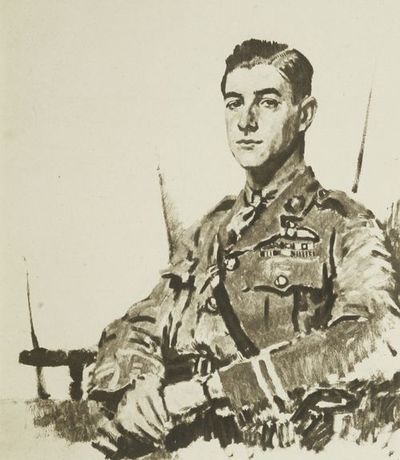
XXX. Major J. B. McCudden, V.C., D.S.O., etc.
Shortly afterwards I lunched at a house—a large party, including two Generals. One sitting near me was telling a lady that he and the other General were going to G.H.Q. the next morning for two days. I said: "Sir, don't you want an extra batman with you?" He said: "Have you any business you want to go to France for?" "Yes, sir," said I, "I have a lot of my stuff moved to Boulogne from Amiens, and I want to see to it." He said: "All right, telephone to —— at the War House and he will have your warrant ready and will get your seat for to-morrow morning." Gee! I was excited when I left that lunch, and darted back to my studio and telephoned to the War Office. Everything was arranged. They even telephoned Intelligence (F) that my car was to meet me at Boulogne. That must have been a nasty knock for Intelligence (F), but my faithful Howlett was there with the car when I got off the boat. We went and had lunch at the "Morny," and I saw (p. 072) my stuff was quite safe at the "Windsor Hotel," then I motored off to St. Valery-sur-Somme and visited the Allied Press Château (Captain Rudolf de Trafford was now the Chief of the Allied Press, Captain Hale having gone back to his regiment, the Black Watch), and arranged with them that I could get a billet there if I could manage to break down the opposition at Intelligence (F). Then I motored back to the École Militaire at Montreuil, where I was to meet General Sir John Davidson, who was giving me dinner and putting me up. After dinner he had to go and see the Chief at his château, and he asked me to go with him. The C.-in-C., as usual, was more than kind, and asked me to dinner the next night. Then I got a bright thought and I asked his A.D.C., Colonel Fletcher, if he would be so kind as to do me a real good turn. He said: "Certainly." So I explained that I wanted him to ring me up at "Bumpherie" (H.Q. Intelligence (F)) at 10 o'clock the next morning, and say the C.-in-C. wanted to know would I dine with him. At 9.15 a.m. the next morning I got down to the little wooden huts which were H.Q. Intelligence (F). There I saw, through the windows in the passage, the two Colonels and Major Lee talking. They saw me all right, but pretended not to, so I walked up and down till a few minutes after 10 a.m., when out came the Major. "Hello, Orpen! is that you? I didn't know you were here." I said cheerfully: "Oh yes, I've been here quite a long time. How are you, old bean? Lovely morning, isn't it?" He said: "Look here, a telephone message has just come through from the C.-in-C. He wants to know if you will dine with him to-night." I said: "A telephone message from the C.-in-C. to me! But why did you come out here?" He said: "To tell you, of course." "But," I (p. 073) said, "you didn't know I was here!" He said: "Answer 'Yes' or 'No.'" "Oh," I said, "answer 'Yes.' I want to fix up with him what date I am coming back to France to work."
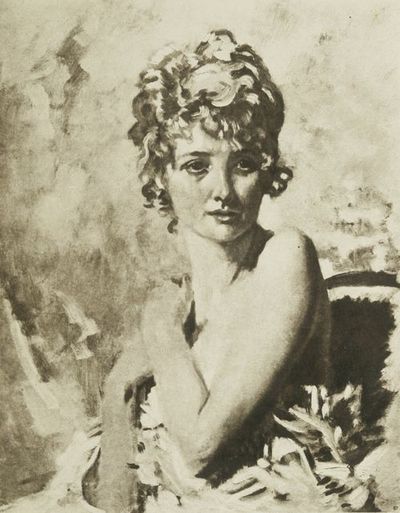
XXXI. The Refugee.
That did the trick. Intelligence (F) saw they were beaten. No more opposition! Perfect harmony was established. I at once became "Orps." Drinks were offered, lunches, dinners—any old thing that could be done was "a pleasure."
The dinner at the Chief's was most interesting. Some American Generals were there, and I learnt a lot about how things were going on, and returned to London the next day, and started making arrangements to go back and work in France again.
About this time I received the following from France:—
"Dear Woppy, I am glad that you
Will soon be back at G.H.Q.,
With brushes, paint and turpentine,
And canvases fourteen by nine,
To paint the British soldier man
As often as you may and can.
The brave ally, the captive Boche,
And Monsieur Clemenceau and Foch;
But, on the whole, you'd better not
Paint lady spies before they're shot.
We're living in the Eastern zone,
Between the ——, the ——, the ——
(The orders of Sir Douglas Haig
Compel me, Woppy, to be vague.)
But you can find out where we are
And come there in a motor-car.
We hold a château on a hill
. . . . . . . (Censored)
A pond with carp, a stream with brill,
And perch and trout await your skill.
A garden with umbrageous trees
Is here for you to take your ease.
And
(p. 074)
strawberries, both red and white,
Are there to soothe your appetite;
And, just the very thing for you,
Sweet landscape and a lovely view.
So pack your box and come along
And take a ticket for Boulogne.
The General is calling me.
Yours, till we meet again,
"M. B."
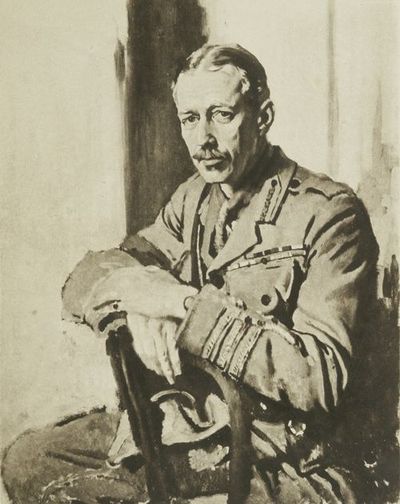
XXXII. Lieut.-Colonel A. N. Lee, D.S.O., etc.
Early in July I returned to France. My brother had now left me, and was doing regular Army work, and I brought Dudley Forsyth over with me. We stayed in Boulogne a few days till our billets were fixed at St. Valery, and during this time I painted a portrait at "Bumpherie" of Lee, who had then become the boss of Intelligence (F) Section and was Colonel A. N. Lee, D.S.O. Things had changed. "The stream of goodwill, it would turn a mill" at "Bumpherie." "Dear old Orps"—nothing was too good for him. "Do you think you could put in a word for me to ——?" "If —— speaks of the matter to you, just mention my name." Oh yes, the Colonel was really my friend now, and all the underlings appealed to me—and a good friend he has been ever since. Dear old Tuppenny Lee; I hope he'll forgive me writing all this, but he was a bit tough on me that first year, and he knows it jolly well, but he has more than made up for it since by a long chalk. There was only one wrong note in the harmony at "Bumpherie" then, and that was a "Colonel" with a large head and weak legs. He never forgave me—he wasn't that sort of fellow.
St. Valery-sur-Somme is a very pleasant little town at the mouth of the river, and the Allied Press held a nice château with a lovely garden. When things were quiet they used to have musical evenings, when Captain Douglas would sing most charmingly, (p. 076) and Captain Holland would play the fool well. Poor Theo! The Boche were at it hard now, and they were bombing all round every night. One night my window and wooden shutters were blown in—four bombs came down quite close. The roar of their falling was terrific. I remember well, after the second had burst, finding myself trying to jamb my head under my bed, but there wasn't room. I was scared stiff.
Soon after this great things happened. The whole world changed—the air became more exhilarating, birds seemed to sing happier songs, and men walked with a lighter step. One great thing happened quickly after another. Ludendorff's black day arrived, and the Boche were driven off the heights of Villers-Bretonneux, and they lost sight of Amiens Cathedral. One day news came that the French had attacked all along the line from Château Thierry to Soissons, and had taken four thousand prisoners! It was all wonderful! Any day on the roads then one passed thousands of field-grey prisoners—long lines of weary, beaten men. They had none of the arrogance of the early prisoners, who were all sure Germany would win, and showed their thoughts clearly. No, these men were beaten and knew it, and they had not the spirit left even to try and hide their feelings.
That great French song, "La Madelon de la Victoire," connecting the names of Foch and Clemenceau, was sung with joy, and yet, when sung, tears were never far away—tears of thankfulness! Many have I seen pour down the cheeks of great, strong, brave men at the sound of that song and the tramp of the sky-blue poilus coming along in the glare and dust.
Forsyth had a song which became very popular about this time. The chorus ran:—
"Mary
(p. 077)
Ann is after me,
Full of love she seems to be;
My mother says, it's clear to see
She wants me for her young man.
Father says, 'If that be true,
John, my boy, be thankful, do;
There's one bigger bloody fool in the world than you—
That's Mary Ann.'"
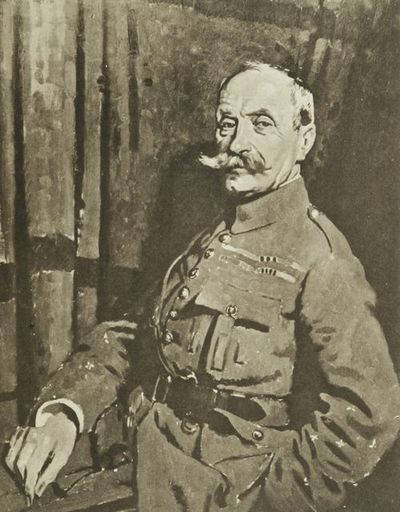
XXXIII. Marshal Foch, O.M.
In August I went down South to paint Marshal Foch at Bon Bon. General Sir John Du Cane kindly put me up at the British Mission, which was quite close to the Marshal's château, and I had a most interesting week. The morning after I arrived, General Grant brought me over to the Marshal's H.Q., a nice old place. We were shown into a waiting-room, and in a couple of minutes General Weygand (Chief of Staff) came in, a quiet, gentle, good-looking little man. It was impossible to imagine him carrying the weight of responsibility he had at that time. He was perfectly calm, and most courteous, and after talking to General Grant for a few minutes, brought us in to the Marshal. And there was the great little man, deep in the study of his maps, very calm, very quiet. He would certainly sit. How long did I want him for? An hour and a half each day, for four or five days? Certainly. When did I wish to start? The next day? Certainly. He would sit from 7 a.m. to 8.30 a.m. for as many mornings as I wished. Might he smoke while he sat? Yes! Bon! Would I go and look out what room would suit me to work in? Any room I liked except the one I was in with the maps. I fixed up a little library to work in—a long, narrow, dark little place, but with a good light by the window. I got up very early the next morning and arrived there about 6.15 a.m., and as nobody seemed to be about, I walked in, and as (p. 078) the only way I knew how to get to the library was through the room with the maps, I opened its door, and there he was, deep in study. He got up, shook hands, and said he would be with me at 7 a.m. In he came at 7 a.m., very quietly, and sat like a lamb, except that his pipe upset him. It seemed that some of his English friends thought he was smoking too many cigars, and they had given him a pipe and tobacco, and asked him to try and smoke it instead. But up to that date the Marshal was not a star at pipe-smoking. He could light it all right, but after about two minutes it would begin to make strange gurgling noises, which grew louder and louder, till it went out. The next day I brought some feathers and cotton wool, and the Marshal looked on me as a sort of hero, because each time we rested I used to clean out the pipe and dry it.
During all the time he was sitting great battles were going on and the Germans were being driven back. News was brought to him about every ten minutes. If it was good, he would say "Bon!" If it was bad, he just made a strange noise by forcing air out through his lips. During that time the Americans were having their first big "do," and I remember he was very upset at the Boche getting out of the St. Mihiel pocket in the way they did, without being caught.
I remember one morning (the Marshal did not know I understood any French at all) a General came in and sat with him, and the Marshal, very quietly, gave him times, dates, places where battles would be fought up to the end of December 1918, naming the French, British and American Divisions, and so forth, which would be used in each. When I got back to the Mission, I wrote down some dates and places I remembered, but told no one, and, as far as I could judge, everything went exactly as he said it would till about the middle (p. 079) of October, when the Boche really got on the run. Then things went quicker than he expected.
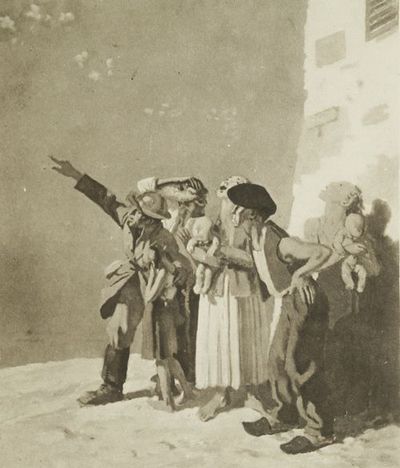
XXXIV. A German 'Plane Passing St. Denis.
It seemed amazing, the calmness of that old château at Bon Bon, yet wires from that old country house were conveying messages of blood and hell to millions of men. What must the little man have felt? The responsibility of it all—hidden in the brain behind those kind, thoughtful eyes. Apparently, his only worry was "Ma pipe." His face would wrinkle up in anger over that. That, and if anyone was late for a meal. Otherwise he appeared to me to be the most mentally calm and complete thing I had ever come across. I would have liked to have painted him standing by his great maps, thinking, thinking for hours and hours. Yes, the three memories I brought away from Bon Bon were maps, calmness, and a certainty that the Allies would be victorious.
While I was there General Grant brought me over to Vaux. What a hall! Surely the most beautiful thing of a private nature in existence, with its blue dome and black eagle at the top.
I left one evening and stopped in Paris that night. There were two air raids, and in the morning I heard Big Bertha for the first time, and when we left about 10 o'clock, just past St. Denis, a Boche 'plane came over to see where the shells were falling.
There was a wonderful service in the Cathedral at Amiens one morning, the first since the bombardment, a thanksgiving for the deliverance of the city from shell-fire. The Boche had been driven further back and the old city was out of shell-range and at peace. It was a lovely morning with a strong breeze, a little sixteenth-century Virgin had been rescued from Albert Cathedral, and it was set up on a pedestal in the middle of (p. 080) the chancel. There was a guard of honour of Australians; birds were flying about above and singing; they had made the interior of the Cathedral their own. Bits of glass kept falling down, and the wind made strange whistling noises through the smashed and battered windows. It was all very impressive. General Rawlinson and his staff came over from Bertangles, a few natives of Amiens came into the town for it, otherwise the whole congregation was British. It was strange! Australian bugles blaring away inside those walls!
I painted Maude and Colonel du Tyl, the brave defenders of the interior of the city during the bombardment, in Maude's cellar in the "Hôtel de Ville." General Rogers (then Colonel Rogers) used to come in constantly—a charming man, very calm, with a great sense of humour, and as brave as a lion. His little brother was working under Maude. At that time his little brother was very silent—one could not get a word out of him. Maude used to call him "my little ray of sunshine." Now he is as cheerful a "Bean" as you could wish to find.
The day the Boche were driven out of Albert, General Rogers went there and brought back the story of the cat. When the Tommies got into the town, even through the din, they heard the wailing of a cat in agony, and they found her crucified on a door, so they naturally went to take her down, but as they were pulling the first nail out, it exploded a bomb and many were killed. It was a dirty trick! Yet they who did it may be sitting beside me now in the little Parisian café in which I write—it is full of Boche. It's a strange thought, almost beyond understanding.
The light in Maude's cellar was most interesting to paint, and I'm afraid I spent far too long at it, but Maude was a good companion. Things were changing now daily. Instead of feeling (p. 081) the sea just behind one's back, so to speak, each day, it was getting further and further away, and there were fresh fields to explore. I was due officially to leave for Italy, but I couldn't go. Why leave France when wonder after wonder was happening? Hardly a day passed that some glorious news did not come in. No, I couldn't tear myself away from Picardy and the North. I felt that I would feel more out of it in Italy than in London, and now I know I was right. I did not do much in the way of my own work, but I saw and felt things I would never have got down South—things which were felt so much that their impression increases rather than diminishes. It is difficult at times to realise what is happening. Somehow other things keep one from realisation at the moment, but afterwards these other things diminish in importance and the real impression becomes more clearly defined.
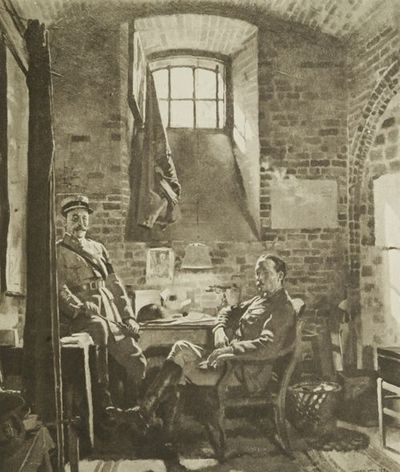
XXXV. British and French A.P.M.'s Amiens.
I painted General Lord Rawlinson at Bertangles, which was then his headquarters, a charming man with a face full of character. He paints himself, and was good enough to take great interest in the sketch I painted of him. He had a mirror put up so that he could see what I was doing. This wasn't altogether a help to me, because, at times, perhaps when I was painting the half-light on his nose, he would say: "What colours did you mix for that?" By the time I had tried to think out what colours I had mixed—most probably not having the slightest idea—I would have forgotten what part of the head I was painting and what brush I was using. But Bertangles in August was lovely, and the lunches in the tent, even though full of wasps, were excellent. Certainly H.Q. 4th Army was well run.
A little later the H.Q. 4th Army moved to the devastated country close to Villers Carbonelle on the Péronne side. It was (p. 082) a wonderful bit of camouflage work. This great H.Q. just looked like an undulating bit of country even when right up beside it. I remember standing in the middle of it one frosty moonlight night, and it was impossible to believe that there were hundreds of human beings all around me there in the middle of that abomination of desolation.
I also painted Brigadier-General Dame Vaughan Williams of the Q.M.W.A.A.C.'s at her H.Q., St. Valery—a strong-minded, gentle, earnest worker, much loved by those under her. She held a château in a large garden and held it well. The mess was excellent.
Some civilians had now come back to Amiens, and it was possible to get a room in the "Hôtel de la Paix," so I left St. Valery and came to live there. This hotel escaped better than any other house in Amiens from the shells and bombs. The glass was, of course, broken, and slates knocked off, but that was all, except where little bits had been knocked out of the walls by shrapnel. It was wonderful to be there and watch the town coming to life again week by week.
After a time the Allied Press came and patched up their château, or parts of it. Some of the correspondents slept there and some got billets outside. Shops began to open. The Daily Mail came once more, and gradually the streets filled with people, these streets, the pavements of which were now more hostile than ever. Even a few of the girls came and settled there—"early birds."
That sweet, natural woman, Sister Rose, had remained in Amiens all through the bombardment, and when the people began returning, she was asked one day: "Are not you pleased, Sister Rose, to have the people round you again?" To which she replied: "Yes, of course I am in some ways, but (p. 083) I loved the bombardment. I felt the whole city was mine, each street became very intimate, and I could walk through them and pray out loud to my God in peace. But now! why, if I prayed to my God in the streets of Amiens they would think me a damned lunatic!" I can understand her very human feeling at that time—people who had run away from the city in its agony returned when its tribulation was over, and claimed it as their own again when the calm of evening had come; while she, Sister Rose, had borne the burden and heat of the day. But this feeling soon left her, and she worked whole-heartedly once more to succour the poor in distress in the city she loved so well.
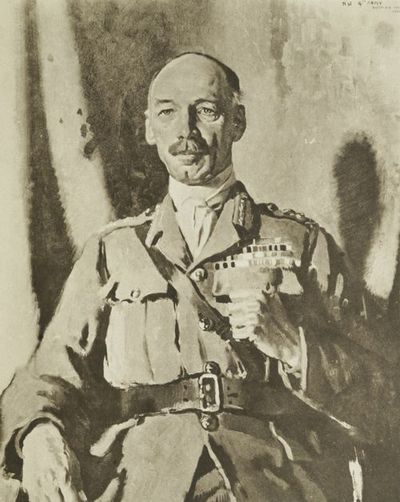
XXXVI. General Lord Rawlinson, Bart., G.C.B., etc.
The nights were very black, there being no lights in the streets at all.
A little later Maude left his billet on the Abbeville Road, and came to live with me in the "Hôtel de la Paix." One night we were dining there, and at about 8.45 p.m. a young Flying Officer left a friend and came and asked Maude if we would come to their table and have a drink with them. Maude said Yes, and the lad went back to his table. "Who is your friend?" said I. "I don't know," Maude replied. "They asked me for ten minutes' extension of time last night, and I gave it to them." Presently we went over to their table and they ordered a round of the deadly brandy of the hotel. Maude introduced me as Major Sir William Orpen, and I learnt that their names were Tom and Fred. After a couple of minutes Tom wanted to ask me something, and he started off this way: "By the way, Sir William——" "A little less of your damned Sir William!" said I. "All right," said he, "don't get huffy about it, bloody old Bill." So naturally we all became friends, and we mounted the stairs to my room, and the bar was opened and Tom recited. Fred insisted on it. "But," said Tom, "you always cry, Fred, when I recite." "It doesn't matter, Tom," said Fred, "I like it." So Tom recited (p. 085) and Fred cried, and Maude and I looked on and wondered and drank "Spots." They left about 11 o'clock to drive back to the aerodrome in an old ambulance they had in the yard. At about 7 a.m. the next morning I was awakened by a violent knocking at my door, so I shouted: "Come in," and in came Tom and Fred. They both walked over and sat on my bed. "What on earth are you here at this hour of the morning for?" I asked. "That's just what we've come here to find out, bloody old Bill," said Tom. "Are you hurt, Bill?" "No," said I. "Why?" "No furniture broken, no damage done to the room, Bill?" "No," said I. "Why?" "Well, look here, Bill, it's like this," said Tom. "Fred and I are puzzled as to exactly what happened. Fred, tell him what happened to you, and then I'll tell him about myself."
Fred rubbed his chin and started: "Well, Bill, the first thing I remember was that I found myself walking along a country road, and I met a M.P. man. Said I: 'Can you please direct me to the Gare du Nord?' 'Straight on,' said he, 'and you'll find it on your left. It's about a twenty-minute walk.' So I went straight on, and sure enough I came to the Gare du Nord, and I came on here and found Tom juggling with the wheel of the old ambulance with its radiator against the wall." "Yes," said Tom, "and look here, bloody old Bill, I had spent half the night juggling with death with that wheel—thank goodness the engine wasn't going. Then Fred woke me up. What do you make of it all, Bill?" I couldn't make anything of it, so I dressed and we had breakfast and they went off to their aerodrome in the Somme mud.
After this we became great friends and we had many happy (p. 086) evenings, in some of which Tom looked for a "spot of bother," and Fred warned him "it was a bad show." On "good nights for the troops," which meant that the weather was impossible for bombing (they were night-bombers), they would come into Amiens for dinner. These nights were "not devoid of attraction," and on the "bad nights for the troops" I would often dine at the aerodrome and see the raiders off. It was uncanny, these great birds starting off into the blackness—to what?
Tom and Fred lived together in a little hut in the Somme mud, off the Péronne Road, which they called "Virtue Villa," and when I worked anywhere away up this old East-West Road, I never could resist visiting "Virtue Villa" on the way back. "Virtue Villa" with its blazing stove, its two bunks—Tom's below, Fred's upstairs—its photographs (especially the one of Fred with the M.C. smile), the biscuit-box seats and the good glasses of whisky—truly "Virtue Villa," with its Tom and Fred, was not "devoid of attraction" on a cold October evening, with the rain splashing on the water in the old Somme shell-holes.
They were a great couple and devoted to each other. One could not eat, drink or be merry without the other, yet they were completely different. Fred was a calm, thoughtful English boy, very much in love and longing to get married; but Tom was just a heap of fun, a man who had travelled to many corners of the earth, but at heart was still a romping school-boy.
About this time George Hoidge's squadron came to a place near Albert, and I had the pleasure of seeing Colonel Bloomfield there again, still as hearty and full of fire as ever. He was going to sit, but things began to happen too (p. 087) quickly then, and I never got a chance of painting him.
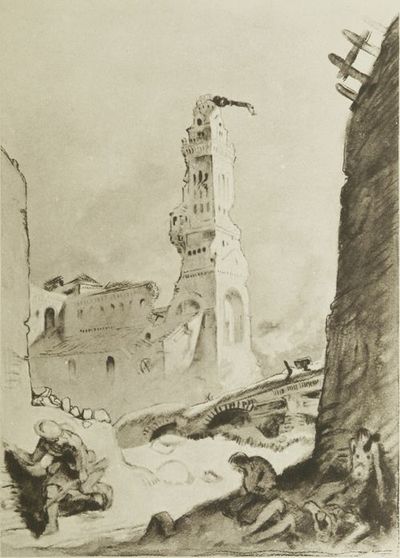
XXXVII. Albert.
Some weeks later, Hoidge came in and said: "I have bad news for you, Orps. Tom and Fred have gone West." It was bad news. Tom and Fred, two gallant hearts, dead! I was told afterwards how it happened. One of the last days of the fighting, Fred went out to test his machine with his mechanic. He taxied off down the aerodrome, which was a huge old Boche one that his squadron had moved forward to. As he was taxi-ing he hit a Boche booby trap, planted in the ground, and up went the machine and fell in flames. The mechanic was thrown clear, but not Fred. Poor Tom saw it all from the door of "Virtue Villa." Out he rushed straight into the flames to Fred. I feel sure Fred's spirit cried out when it saw Tom coming in to the flames: "You're looking for a spot of bother, Tom, but it's a good show, Tom, a good show!"
When the petrol burnt out and they got to them, they found Tom with his arms round Fred. Greater love hath no man. That is how Tom and Fred "went West." I hope they have found another "Virtue Villa" not "devoid of attraction" high up in the blue sky, where they were often together in this life. Let us admit they were a "good show"—in death they were not divided. Their Major wrote to me: "The Mess has never been the same since." The world itself will never be the same to those who loved Tom and Fred and their like who have "gone West."
Thinking of them reminds me of those good lines by Carroll Carstairs, written in hospital after he was so badly wounded:—
"I
(p. 088)
have friends among the dead,
Such a gallant company,
Lads whose laugh is scarcely sped
To the far country.
"Jolly fellows, it would seem
That they have not really gone—
Rather while I've stayed to dream
They have marched serenely on."
"Mud
Everywhere—
Nothing but mud.
The very air seems thick with it,
The few tufts of grass are all smeared with it—
Mud!
The Church a heap of it;
One look, and weep for it.
That's what they've made of it—
Mud!
Slimy and wet,
Churned and upset;
Here Bones that once mattered
With crosses lie scattered,
Broken and battered,
Covered in mud,
Here, where the Church's bell
Tolled when our heroes fell
In that mad start of hell—
Mud!
That's all that's left of it—mud!"
The Boche were now nearly on the run. I remember one day I went out with General Stuart and Colonel Angus McDonnell—the General was the railway expert, and was out to ascertain what amount of damage the Boche had done to the lines, permanent way, etc. General Stuart was a quaint little man. He seldom spoke, but when he did it was very much to the point and full of dry humour. The Hon. Angus McDonnell, a true Irishman, was a most attractive person, full of charm. He'd kissed more than the Blarney Stone, and had received all the good effects, and we had some most interesting days together. On the particular one I mention, we went away beyond Cambrai to a place called Caudry, where the General inspected the station and the general damage to the metals and permanent way, after which we left and lunched by the side of a road which ran through fields. All was peace, not a sound from the guns—when suddenly shrapnel started bursting over these fields. No one was in sight; a few Englishmen on horseback galloped past, apparently for exercise. The Boche, I presume, couldn't see, but just let off on chance. It was better than leaving the shells there for us.
After lunch we motored down to St. Quentin, and on the way stopped and explored the great tunnel in the Canal du Nord. What a stronghold! It seemed impossible that the Boche (p. 091) could have been driven out of it. On the way down we travelled along a road pavé in the middle, with mud on each side and the usual rows of trees, then a dip down to the fields. These fields were full of dead Boche and horses. The road had evidently been under observation a very little while back, as the Labour Corps were hard at work filling in shell-holes, and the traffic was held up a lot. In one spot in the mud at the side of the road lay two British Tommies who had evidently just been killed. They had been laid out ready for something to take them away. Standing beside them were three French girls, all dressed up, silk stockings and crimped hair. There they were, standing over the dead Tommies, asking if you would not like "a little love." What a place to choose! Death all round, and they themselves might be blown into eternity at any moment. Death and the dead had become as nothing to the young generation. They had lived through four years of hell with the enemy, and now they were free. Another day I went to Douai, and there I saw the mad woman. Her son told us she had been quite well until two days before the Boche left, then they had done such things to her that she had lost her reason. There she sat, silent and motionless, except for one thumb which constantly twitched. But if one of us in uniform passed close to her, she would give a convulsive shudder. It was sad, this woman with her beautiful, curly-headed son. Later she was moved to Amiens, where she had relatives. After about six months she became quite normal again, and does not remember anything about it. The last time I saw her she was cleaning the upstairs rooms at "Josephine's," the little oyster-shop off the Street of the Three Pebbles.
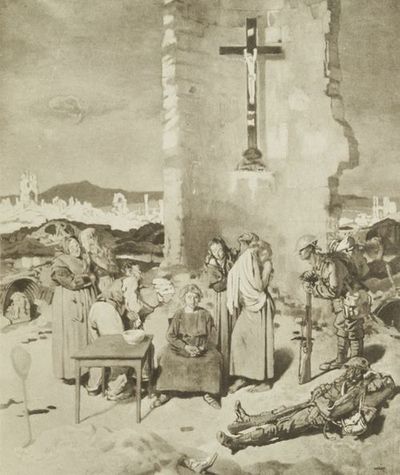
XXXVIII. The Mad Woman of Douai.
One night at the "Hôtel de la Paix" a weird thing happened. One (p. 092) often hears strange stories of the powers different men and women have over individuals of the opposite sex. As a rule, one hears, one smiles, or one is rather disgusted; but seldom do we admit to ourselves that these stories may be absolutely true—we nearly always smile and think we are clever, and say to ourselves: "Ah! there's something behind that." Rasputin, for instance, what was he? Had he power? We wonder a little and dismiss the thought.
On this night, at about 9 o'clock, the early diners had gone, but there were about thirty of us left who would testify to the truth of this tale. A man walked in and sat down at a large empty table. He was a French civilian, dressed in black, tall and slim, with an enormous brown beard—a "Landru." Marie Louise, one of the serving-girls, asked him what he required, and he said: "A glass of Porto." This she brought him, but as she was placing it on the table, he put out his hand and touched her arm, and let his fingers run very gently up and down it. He never spoke a word. She retired and returned with another glass of port, and sat down beside him and commenced to drink it; no word was uttered. Again he raised his hand, beckoned to another serving-girl; the same act was gone through, and she sat down with her port. This continued without a word of conversation until he had all the serving-girls, about eight of them, sitting round in silence. We all sat and looked on in amazement for a while, but after about ten minutes hunger got the better of us, and we started calling them for our food. They took not the slightest notice of us, but in the end we made so much noise that Monsieur Dyé, the manager of the hotel, came in. He was a hot-tempered man, who never treated the girls under him kindly, and when he saw and heard his customers shouting for food, and saw all his serving-girls (p. 093) sitting down drinking port, his face went black with rage, and he rushed over to their table and cursed them all roundly, but they took not the slightest notice. Then he turned on the man with the beard and ordered him out of the hotel. He never answered, but got up slowly, put on his hat and left. As soon as he rose from the table all the girls went back to their work as if nothing had happened, and we continued our dinner. It was a strange affair—not one of those girls remembered anything about it afterwards.
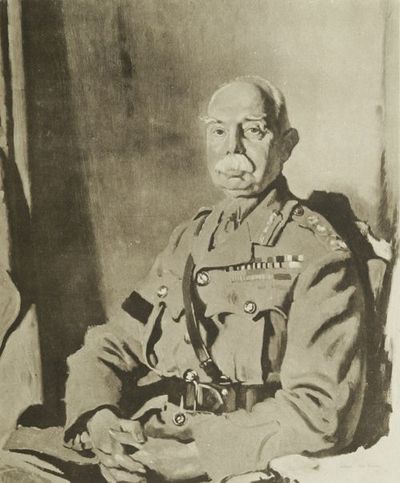
XXXIX. Field-Marshal Lord Plumer of Messines, G.C.B., etc.
Again I went to Cassel, to paint General Plumer. I arrived there one evening, and had dinner with Major-General Sir Bryan Mahon, who was on his way to Lille. I woke up in the morning, got out of bed and collapsed on the floor. "'Flu!" After three days the M.O. said I must go to hospital. I said: "Hospital be damned! I'm going to paint to-morrow." So I wrote and told General Plumer I would work the next morning if he could spare the time to sit. He replied he could. So on a very cold morning I made my way rather giddily up the stone steps to the Casino and on to his little château. There I was met by the General's grand old batman. He stopped me and said: "Have you come to paint the Governor's portrait, sir?" "Yes," said I. "Well," said he, "let me have a look at you. You're feeling a bit cheap, ain't you? The Governor told me you've been having the 'flu'." "Yes," I said, "I'm not feeling up to much." "Well, now," said he, "the Governor is busy for the moment, but he told me to look after you and fix up what room you would like to work in, but first I want to get you a bit more up to scratch. Just come along and have a glass of port." So he brought me off and gave me an excellent glass. Then I chose the General's bedroom to work in, and we fixed everything up. Then he said: (p. 094) "Now I'll go and fetch the old man." Off he went and back he came, and with a wink, said: "He's coming," and in walked the General. A strange man with a small head, and a large, though not fat, body, and a great brain full of humour. He also was very calm, and made things very easy for me, but his batman was not so easy to please. When I got the General the way I wanted him, the batman leant over my shoulder, and said: "Is the Governor right now?" "Perfectly," I replied. "No, he ain't," said he, "not by a long chalk." And he went over to the General and started pulling out creases in his tunic and said: "'Ere, you just sit up proper—not all 'unched up the way you are. What would Her Ladyship say if I let you be painted that way?" At last we got him satisfied, and he departed. When the door was shut, the General said: "Well, that's over," and settled down in comfort.
After I had worked for about an hour and a half there was a knock at the door and in the batman came. He took no notice of the General, but laid his hand on my shoulder and said: "Look up at me." I obeyed. "Won't do," said he. "You wants keeping up to the mark," and retired, and came back with an enormous glass of port. When the sitting was finished, I went back to bed at the "Sauvage," very giddy and slightly muzzed.
The next morning the batman again arranged the General "to Her Ladyship's liking," and left. As soon as he had gone, the General said: "We've got him on toast. He's worried to death because you haven't painted the gold leaves on my red tab. Don't do it till the very last thing." It worked splendidly. The old chap was really upset. Every hour he used to come in and tap me on the shoulder, point to the red tab, (p. 095) and say: "What about it? If you don't get them gold leaves proper, I'll get it from Her Ladyship." He was a great servant of the true old class, one of those who never lose their place, no matter how freely they are treated, and was ready to die for his master at any minute.
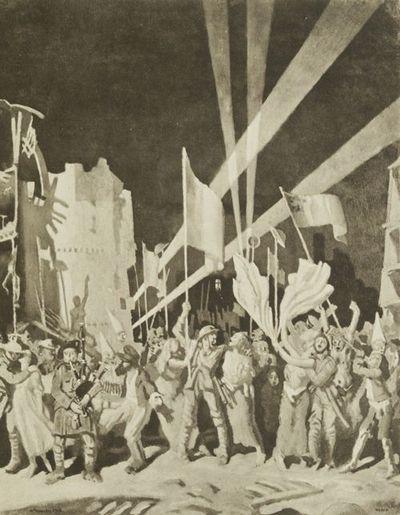
XL. Armistice Night. Amiens.
Soon after this the General and his staff moved forward, and Cassel became a dead little place as far as the Army was concerned. Things were going very quickly, and scarcely a day passed that one could not mark a new front line on one's map.
I went out to see the damage done to Bailleul. In a few days British artillery had flattened it out as badly as Ypres. One could hardly find out where the main Place had been. Now one could wander all over the Ypres salient. Was there ever a more ghastly place? Even the Somme was outdone. Mud, water, battered tanks, hundreds of them, battered pillboxes, everything battered and torn, with Ypres like a skeleton. The Menin Road, the Zonnebeke Road, what sights were there—mangled remains of superhuman effort!
I remember one day in the summer being down at Lord Beaverbrook's when news came in that Locre had fallen. I had no knowledge of Locre, but Lord Beaverbrook, I could see, felt that the loss of it was a very serious thing. So I went to see Locre—a ghastly place!—the fighting must have been terrific. Shell-holes full of dead Germans. Everything smashed to pulp. I should imagine, before Hell visited it, Locre must have been a very pretty little place. It is on a hill which looks down into a valley, with Mont Kemmel rising up the other side.
Suddenly my blood poisoning came on again badly, so I returned to Amiens on November 10. When we had just passed (p. 096) Doullens we got the news that the Kaiser had abdicated. Great excitement prevailed everywhere. The next day, at 11 a.m., I was working in my room and heard guns, so I went to the window and saw the shells bursting over the town, but I could not see the Boche 'plane. It must be very high, I thought. About ten minutes afterwards there was a sound of cheering, so I knew the fighting was over. I went again to the window and looked down into the courtyard. It was empty, except for one serving-girl, Marthe, who had her apron to her face and was sobbing bitterly. Presently, Marie-Louise came up to my room and told me the news, and we had a drink together in honour of the great event. Said I: "What has happened to poor Marthe? It is sad that she should be so upset on this great day. What is the matter?" "Ah!" said Marie-Louise, "it is the day that has upset her." "The day?" said I. "Yes," replied Marie-Louise, "you see, her husband will come out of the trenches now and will come back to her. C'est la Guerre!"
Later, Maude came in, and I asked him what on earth a Boche was doing over Amiens just at the moment the fighting ceased. "Oh," said Maude, "there wasn't any Boche, but the anti-aircraft chap got orders to fire off his guns for ten minutes when the Armistice was signed, but, as he had nothing but live shells, he thought he had better stop after two." But why he burst his shells right over the centre of the town was never explained.
Yet, on this day, looked forward to for years, I must admit that, studying people, I found something wrong—perhaps, like all great moments expected, something is sure to fall short of expectations. Peace was too great a thing to think about, the longing for it was too real, too intense. For four years the fighting (p. 097) men had thought of nothing except that great moment of achievement: now it had come, the great thing had ceased, the war was won and over. The fighting man—that marvellous thing that I had worshipped all the time I had been in France—had ceased actively to exist. I realised then, almost as much as I do now, that he was lost, forgotten. "Greater love hath no man"—they had given up their all for the sake of the people at home, gone through Hell, misery and terror of sudden death. Could one doubt that those at home would not reward them? Alas, yes! and the doubt has come true. It made me very depressed. The one thing these wonderful super-men gave me to think that evening was: "What shall we do? Will they do as they promised for us? I gave up all my life and work at home and came out here to kill and be killed. Here I am stranded—I cannot kill anyone any more, and nobody wants to kill me. What am I to do? Surely they will give me some job: I have done my bit, they can't just let me starve." "When you come back home again"—yes, that crossed their minds and mine for them. Wending my way home through the blackened streets that night, I met a Tommy who threatened to kill me because of his misery. I talked him down and brought him to my room, and told him I really believed he would have a great time in the future. I doubted what I said, but he believed me, and went off to his billet happy for that one night.
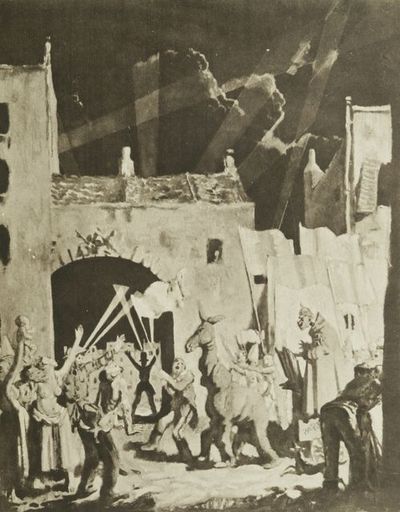
XLI. The Official Entry of the Kaiser.
Could anyone forecast the tragedy that has happened to so many of these men since? That great human Field-Marshal, Lord Haig, the man who knows, works for them still, and asks—but who answers? Great God! it makes one think, remember, think and wonder, what impossibly thankless people human beings are. It is sad, but very, very true!
Captain Maude left Amiens and became Major Maude, D.S.O., A.P.M. Cologne. I missed him greatly, and it depressed me very much being left in that old town, but the doctors flatly refused to let me move, so I just had to grin and bear it.
I then got more ill and took to my bed. My recollections from that time to the middle of January are very hazy. People were very kind to me, and used to come and sit with me for hours, especially two Rifle Brigade boys—Stevens and Riviere—two of the best. Stevens had just come back from Brussels, where there had been great times, music and dancing. Apparently the great tune of that period was "Katie"; anyway Stevens could not get it out of his head. He never knew how near he was to sending me completely mad, by singing gently to himself as the winter afternoons drew in:—
"K-K-K-Katie, beautiful Katie,
You're the only g-g-girl that I adore,
When the ke-moon shines on the Ke-cowshed;
I'll be waiting at the Kitchie Kitchen door."
Long afterwards, during the Peace Conference, whenever I heard that tune in the "Majestic," my mind went back to the misery and semi-darkness in that dirty room in Amiens.
On New Year's Eve, Angus McDonnell came all the way from (p. 099) G.H.Q. and had me lifted out to dinner, so I must have been better then. General Sir John Cowans also came all the way from G.H.Q. to see how I was. Kindness is a wonderful thing.
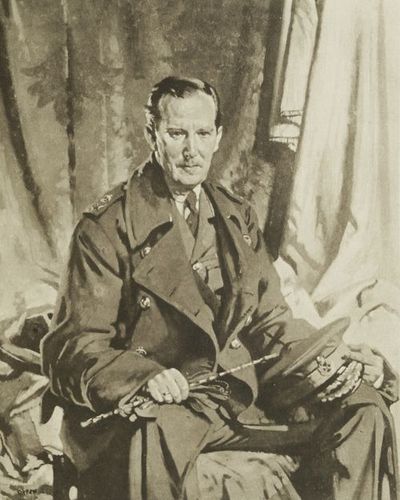
XLII. General Sir J. S. Cowans, G.C.B., etc.
The Allied Press disbanded, and I gave a dinner to the boys at the "Hôtel de la Paix." It was all arranged by my chauffeur, Gordon Howlett, and my batman, Green, and it was well done. Great were the songs and dances, and great was the amount of liquid put away. I was lifted downstairs and laid out beside the table, and the lads presented me with a magnificent silver ash-tray.
Towards the end of January, I was allowed out and about again, and I went up to G.H.Q. to paint the Q.M.G., who put me up in his château. I painted him, and also did some work down at "Bumpherie," including a drawing of Lieutenant Brooks, who took the most wonderful official photographs during the war, often at great personal risk. I remember a story that went round in 1917, in which there was not a word of truth, but it was amusing. A terrible-looking Tommy stopped Brooks in the Street of the Three Pebbles and said: "Say, guv'ner, when are you going to give me me photo?" "What photo? Who are you?" said Brooks. "Blimy," said the Tommy, "you don't know me, and me the bloke as was killed going over the top for you!"
I now got a reminder that I was due in Paris to paint the Peace Conference. The whole thing had gone from my mind. I afterwards found the letter, which I apparently had received and read, dated December, telling me to go to Paris, but I was so sick I did not realise what it was about. I realised now right enough, so I packed my bag and breezed away (p. 100) to Paris, and found that great family gathering, the Peace Conference, and the life of the "Astoria" and the "Majestic" commenced for me.
The great family really was composed of a number of little families. Mine consisted of Lord Riddell, George Mair, Lieut.-Colonel Stroud Jackson, D.S.O., George Adam, Sidney Dark and Gordon Knox, and great were the meetings at Foucquet's before lunch.
For the most part, my life consisted now of painting portraits at the "Astoria," or attending the Conference at the "Quai d'Orsay." During these I did little drawings of the delegates. For a seat I was usually perched up on a window-sill. It was very amusing to sit there and listen to Clemenceau—"Le Tigre"—putting the fear of death into the delegates of the smaller nations if they talked too long. Apparently, the smaller the nation he represented, the more the delegate felt it incumbent on himself to talk, but after a while, Clemenceau, with the grey gloves whirling about, would shout him down.
President Wilson occasionally rose and spoke of love and forgiveness. Lloyd George just went on working, his secretaries constantly rushing up to him, whispering and departing, only to return for more whispers. Mr. Balfour, whose personality made all the other delegates look common, would quietly sleep. The Marquis Siongi was the only other man who could hold his own at all with Mr. Balfour in dignity of appearance.
As a whole there was just a little mass of black frock-coated figures—"frocks" as we called them—sitting and moving about under the vast decoration of "Le Salon de l'Horloge." Some of the little people seemed excited, but for the (p. 101) most part they looked profoundly bored, yet they were changing the face of the map, slices were being cut off one country and dumped on to another. It was all very wonderful, but I admit that all these little "frocks" seemed to me very small personalities, in comparison with the fighting men I had come in contact with during the war.
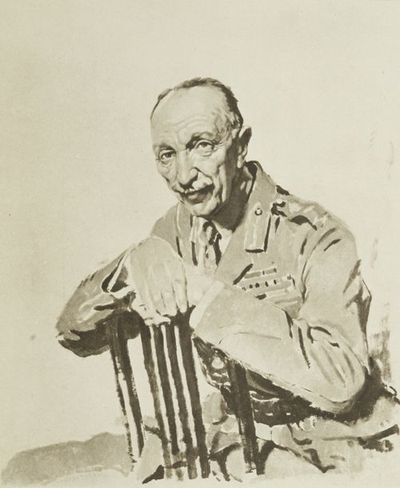
XLIII. Field-Marshal Sir Henry H. Wilson, Bart., K.C.B., etc.
They appeared to think so much—too much—of their own personal importance, searching all the time for popularity, each little one for himself—strange little things. President Wilson made a great hit in the Press with his smile. He was pleased at that, and after this he never failed to let you see all his back teeth. Lloyd George grew hair down his back, I presume from Mr. Asquith's lead. Paderewski—well, he was always a made-up job. In short, from my window-seat it was easy to see how self-important the majority of all these little black "frocks" thought themselves. It was all like an opéra bouffe, after the people I had seen, known and painted during the war; and these, as the days went by, seemed to be gradually becoming more and more forgotten. It seemed impossible, but it was true. The fighting man, alive, and those who fought and died—all the people who made the Peace Conference possible, were being forgotten, the "frocks" reigned supreme. One was almost forced to think that the "frocks" won the war. "I did this," "I did that," they all screamed, but the silent soldier man never said a word, yet he must have thought a lot.
I remember when the Peace Terms were handed to the Germans at the Trianon Palace, I tried my hardest to get a card to enable me to see it, but failed. This may not seem strange, but it really was, considering that about half the people who were present were there out of curiosity alone. (p. 102) They were just friends of the "frocks." This ceremony took place at 2.30 p.m. on that particular day. I happened to leave my room and go into the hall of the "Astoria" for something about 3 p.m. There I met Field-Marshal Sir Henry Wilson. I said: "How did you get back so soon, sir?" He said: "Back from where?" I said: "From the handing over of the Peace Terms." "Oh," he said, "I haven't been there. They wouldn't give me a pass, the little 'frocks' wouldn't give me one." "I've been trying for days, sir," I said. "They expect me to paint them, but they won't let me see them." "Look here, little man," he said. "I've been thinking as I was walking back here, and I'll give you a little piece of advice: 'Laugh at those who cry, and cry at those who laugh.' Just go back to your little room and think that over and you will feel better."
When I painted Sir Henry, he gave me his views on the brains and merits of many of the delegates, views full of wit and brilliant criticism, but when I had finished painting him I came under his kindly lash. He called me "a nasty little wasp," and he kept a "black book" for any of his lady friends who said the sketch was like him. In it their names were inscribed, and they were never to be spoken to again. With all his fun, Sir Henry was a deep thinker, and towered over the majority of the "frocks" by his personality, big outlook and clear vision.
General Botha was big, large and great in body and brain—elephantine! Everything on an immense scale, even to his sense of humour. He had no sign of pose, like most of the "frocks." He never seemed to try to impress anyone. One could notice no change in his method or mode of conversation according (p. 103) to whom he was speaking. The great mind just went on and uttered what it thought, regardless of whom it uttered it to. In Mrs. Botha he had the ideal wife. Together they were like two school-children. "Louis" and "Mother," how well they knew each other, and how they loved their family and home! They were always talking of "home" and longing to get back to it. Alas! Louis only got back there for a very short time, and now "home" will never be the same for "Mother."
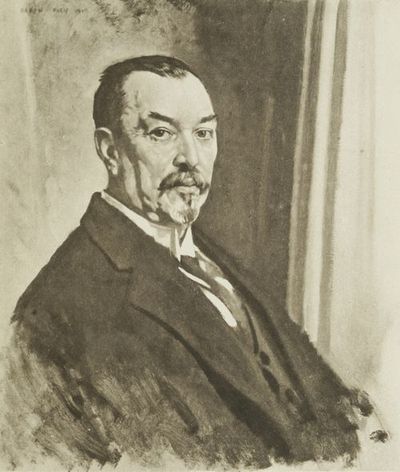
XLIV. The Rt. Hon. Louis Botha, P.C., LL.D.
What arguments they used to have—fierce arguments which always ended the same way! "Louis" would make some remark which would absolutely pulverise "Mother's" side of the question, and as she was stammering to reply, he would say very gently: "It's all right, Mother, it's all right, you've won." And she would flash out with: "Don't you dare to say that to me, Louis! You always say that when you get the best of the argument."
She used to complain to me how terrible the General's love for bridge was, and how she used to be kept up so late. He would laugh and say: "But, Mother, you didn't get up till nine this morning. I was walking in the Bois at half-past six."
I remember one afternoon they came to my room and Mrs. Botha said: "Well, Louis, what kind of a morning had you?" He replied: "Not very good, Mother, not very good. You see, Mother, Clemenceau got very irritated with President Wilson, and Lloyd George the same with Orlando. No, it wasn't a very pleasant morning. Nearly everyone was irritable." Then "Mother" said: "I think it disgusting, Louis, that these men, settling the peace of the world, should allow their own little petty irritabilities to interfere with the great work." (p. 104) And Botha replied: "Ah! Mother, you must make allowances. Men are only human." "I don't make allowances," jerked in "Mother," "I think it's disgusting." "Don't say that, Mother," he replied. "I remember one time, long ago, when we made our little peace, you used to get very irritable at times, and I had to make a lot of allowances for you. You must try and make the same for these poor people now." "Mother" never even replied to this, but jumped from her chair and left the room, and the big man's face broadened into a smile. Yes, Botha was big—a giant among men.
Admiral Lord Wester Wemyss came along. He has a good head for a "Sea Dog." He brought the sea into the heart of Paris with him. A man of great charm, with a wonderful smile, which I did not paint.
I wrote and asked President Wilson to sit, and got a reply saying that as his time was fully occupied with the Peace Conference work, he regretted that he was unable to give any sittings.
I also wrote to Mr. Lansing and Colonel House, asking them. The Colonel rang up the same afternoon and said, "Certainly," would I name my day and hour? Which I did; and along he came, a charming man, very calm, very sure of himself, yet modest. During the sitting he asked me if I had painted the President. I replied: "No." He then asked me if I was going to do so, and I replied: "No," that the President had refused to sit. He said: "Refused?" I said: "Yes; he hasn't got the time." "What damned rot!" said the Colonel, "he's got a damned sight more time than I have. What day would you like him to come to sit?" I named a day, and the Colonel said: "Right! I'll see that he's here," and (p. 105) he did. Mr. Lansing was also very good about giving sittings, and we had a good time, as he loves paintings, and knows all the Art Galleries in Europe. He also paints himself in his spare time, and all through the Conference at the "Quai d'Orsay" he drew caricatures of the different delegates. President Wilson told me he had a large collection of these.
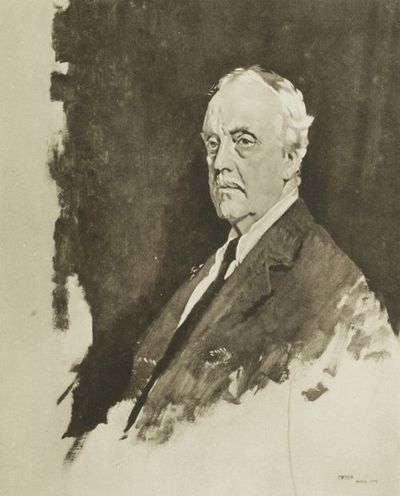
XLV. The Rt. Hon. A. J. Balfour. O.M.
When Lord Reading sat he had the "'flu," and did not talk, so I got nothing out of him except that he has a very fine head.
The Emir Feisul sat. He had a nice, calm, thoughtful face. Of course, his make-up in garments made one think of Ruth, or, rather, Boaz. He could not let me work for one minute without coming round to see what I was doing. This made the sittings a bit jerky. I was going to paint another portrait of him for his home, but we never hit off times when we were both free.
I asked Mr. Balfour to sit, and he asked me to lunch to arrange it. The subject was never mentioned, but the lunch in the Rue Nito was excellent, and it was a joy to listen to Mr. Balfour. One could also look down into President Wilson's garden, as Mr. Balfour's flat was on the second floor, and one could see over the armed defences and view the American Army on guard outside, with steel helmets and bayonets flashing in the sunlight.
Mr. Balfour did sit in the end. I remember he came to my room about 12.15 p.m. He was sound asleep by 12.35 p.m., but woke up sharp at 1 p.m., and left for lunch. What a head! It put all other heads out of the running. So refined, so calm, so strong, a fitting head for such a great personality.
Dr. E. J. Dillon very kindly asked me to dinner to meet Venezelos, and he arranged for him to sit, which he did at the (p. 106) "Mercèdes Hotel." He had a beautiful head, with far-seeing blue eyes, which had a distinctly Jewish look. It was difficult to paint him, as he had no idea of sitting at all. It was a pity, as he had a wonderful head to paint. His flesh was fresh and rosy like a young boy's.
Da Costa, of Portugal, came along: a bright little man, full of health and energy; and after him that quiet, thoughtful friendly person, Sir Robert Borden, of Canada; even then he looked rather tired and overworked.
General Sykes sat. What a strange head! A sort of mixture between Hall Caine and Shakespeare.
The day arrived when President Wilson was to sit. He was to come at 2 p.m., so I went back to the "Astoria" about 1.30. When I got to the door I found a large strange man ordering all the English motors to go one hundred yards down the Rue Vernet. No British car was allowed to stop closer. When I entered the "Astoria," one of the Security Officers told me that an American detective had been inquiring the direct route the President was to take to my room. I went on into another little room I had, where I kept my paints and things; and there I found two large men sitting in the only two chairs. They took no notice of me, and were quite silent, so I proceeded to get ready. Taking off my belt and tunic, and putting on my painting coat, I started to squeeze out colours, when suddenly in marched an enormous man. He looked all round the room and said in a deep voice: "Is Sir William Orpen here?" "Yes, I'm here," I said. He walked up to me and, towering over me, looked down and said in grave doubt: "Are you Sir William Orpen?" "Yep," I replied, in my best American accent. "Well," he said, "be pleased to dress yourself and proceed to the door and prepare to receive the (p. 107) President of the United States of America." That finished me—I had been worked up to desperate action. So I looked up as fully as I could in his face, and uttered one short, thoroughly English word, but one which has a lot to it. Immediately the two large men and the enormous one left the room in utter silence.
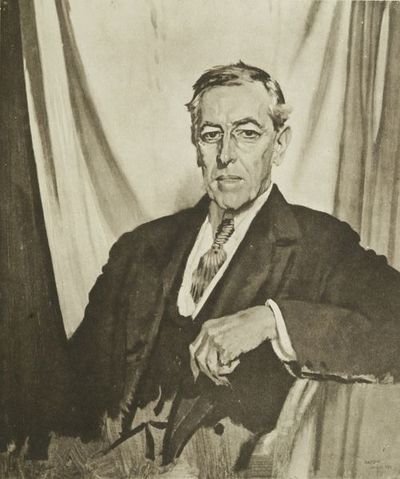
XLVI. President Woodrow Wilson.
Shortly afterwards the President arrived, smiling as usual; but he was a good sort, and he laughed hard when I told him the story of the detectives. He was very genial and sat well, but even then he was very nervous and twitchy. He told endless stories, mostly harmless, and some witty. I only remember one. A king was informed that all the men in his State were obeying their wives; so he ordered them all before him on a certain day and spoke to them, saying he had heard the fact about their obeying their wives, and he wished to ascertain if it was so. So he commanded, "All men who obey their wives go to my left!" They all went to his left except one miserable little man, who remained where he was, alone. The king turned, and said to him: "Are you the only man in my State who does not obey his wife?" "No, sire," said the little man, "I obey my wife, sire." "Then why do you not go to my left as I commanded?" "Because, sire," said the little man, "my wife told me always to avoid a crush." It's a mild story, but it's the only one I remember. The only other thing I recollect about President Wilson is that he had a great admiration for Lord Robert Cecil.
General Sackville-West came, and we had some peaceful sittings. A very calm, very sad man, but he was kindness itself. Many are the acts for which I have to thank him.
Lord Beatty arrived in Paris. A lunch was given in his honour at the Embassy, after which he came back with me to (p. 108) the "Astoria," and sat. A forceful character! I may be wrong, but I imagine he did not love the "frocks."
George Adam gave a great dinner one night out at some little country place near Paris. Mr. Massey, of New Zealand, and Admiral Heaton Ellis were the two chief people present. Massey was a most pleasant big man, with kind, blue eyes—a simple, honest, straightforward person, large in body and big enough in brain to laugh at himself. He made me feel I was back painting the honest people in the war. He had none of the affectations of the "frocks."
I painted the Marquis Siongi in his flat in the Rue Bassano. There one worked in the calm of the East. People entered the room, people left, but I never heard a sound. The Marquis sat—never for one second did his expression give an inkling of what his brain was thinking about. He never moved; his eyelids never fluttered, and beside me all the time I worked, curled up on a sofa, was his daughter—surely one of the most beautiful women I have ever seen, soft and gentle, with her lovely little white feet. I loved it all. When I left that flat I could not help feeling I was going downstairs to a lower and more common world, a world where passions and desires were thrust upon one's eyes and ears, leaving no room for imagination or wonder. I never pass down the Rue Bassano now that I do not think of the Marquis and those lovely little white feet, the gentle manners and the calm of the East which pervaded those apartments.
General Smuts sat, a strong personality with great love for his own country, and a fearless blue eye. I would not like to be up against him, yet in certain ways he was a dreamer and poet in thought. He loved the people and hated the "frocks." He and I had a great night once at the servants' dance (p. 109) down in the ballroom of the "Majestic." I found him down there during the evening, and he said: "You've got sense, Orpen. There is life down here, but upstairs it's 'just death.'"
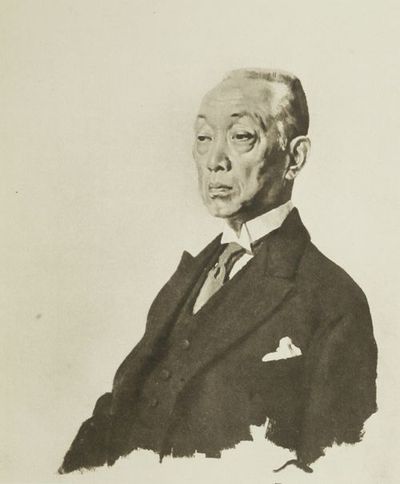
XLVII. The Marquis Siongi.
Mary was, of course, the "Belle of the Ball." No description of the Peace Conference could be complete without including Mary. One great man said that the most joyous sight he saw in Paris was Mary. Mary doled us out tea and cigarettes in the hall of the "Majestic"—doled them out with a smile of pure health. Mary came from Manchester, yet she made the Parisian girls look pale, pallid and washed out. Her rosy cheeks had a smile for everyone, men and women; one and all loved Mary. She really was the greatest personal success of the Peace Conference. How the people of Manchester must have missed her, and how lucky they are to have her back again!
Another delegate with no affectation was Mr. Barnes, a restful, thoughtful soul. He brought Mrs. Barnes in one afternoon, a charming, quiet lady. They should be painted together as an ideal English couple.
Another good Englishman, Lord Derby, our Ambassador, sat to me. Some day will be known all the good he has done in France. Loved by all, this joyous, bluff, big-hearted Englishman has done great things in keeping friendship and goodwill between the two nations through many anxious moments. One felt better after being at the Embassy and hearing his great laugh. He was not a bit like a "frock"; whether he loved them or not, I don't know. He was far too clever to let me know, but he was too kind-hearted to hurt anybody or anything, and he certainly loved the fighting man—French, English or American.
Mr. (p. 110) Hughes made a big mark at the Conference. He was as deaf as a post, but he had a cutting wit. Many are the good stories told about him, but they are not mine. Clemenceau and he used to have great jokes. Often I have seen them rocking with laughter together, Clemenceau's grey-gloved hands on Hughes' shoulders, leaning over him and shouting into his enormous deaf cars. He came to sit one day with The Times. He said: "Good morning." I asked him to sit in a chair. He sat, read The Times for about an hour and a half, murmured something that I did not catch, got up and left. The next day he rang up and asked if I wished for another sitting. I said: "No, sir," so that was my only personal meeting with Hughes; but I gather he was extremely cute and cunning, which is quite possible from the general make-up of his head.
That warrior, General Carton de Wiart, V.C., came to sit: a man who loved war. What a happy nature! He told me he never suffered any pain from all his wounds except once—mental pain—when he temporarily lost the sight of his other eye, and he thought he might be blind for life. A joyous man, so quiet, so calm, so utterly unaffected. What a lesson to the "frocks"!
Another man of great personal charm was Paul Hymans, of Belgium. He was greatly liked and respected by the British delegates.
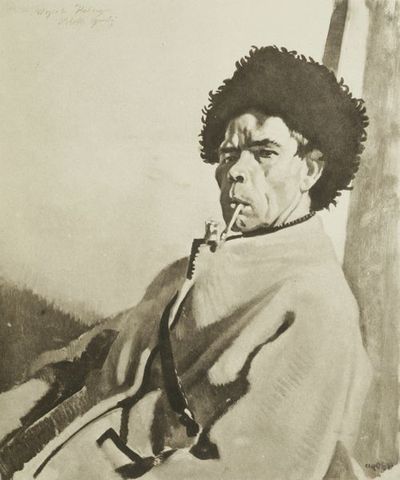
XLVIII. A Polish Messenger.
Shortly after I arrived in Paris I found one could get "Luxury Tax Tickets." I had never heard of a Luxury Tax up North, but it was in force in Paris right enough. So I went to H.Q. Central Area, and inside the door whom should I meet but my one-time "Colonel" of G.H.Q. "Hello!" said he. "What are you doing in Paris?" "Painting the Peace Conference, sir," said I. "Well, what do you want here?" he asked. "I've come for some Luxury Tax Tickets, sir." "To what are you attached now?" he asked. "C.P.G.H.Q., sir," said I. "Well," he said, "if you are attached to G.H.Q. you must go there and get your Luxury Tax Tickets. You can't get them here." "Right, sir," said I. "Will you please sign an order for me to proceed to G.H.Q. to obtain Luxury Tax Tickets and return? and I will start right away, sir." "Well," he said, "perhaps, after all, I will allow you to have some here, as you are working in Paris." "Thank you very much indeed, sir," said I, clicking my heels and saluting. But it was no good, we never could become friends, as I said before.
One afternoon in the hall at the "Astoria" I saw a strange man—a paintable person—and I asked the Security Officers to get him to sit to me. He was a Polish messenger. He came along the next morning, sat down and smoked his silver (p. 112) pipe. I said: "Can you understand any English?" "Yes," said he, in a strong Irish accent, "I can a bit." "But," I said, "you talk it very well. Have you lived in Ireland?" "No," said he, "but I went to the States for about six months some fifteen years or more back, and that's where I picked up the wee bit I have." I began to think he must be de Valera or some other hero in disguise. Perhaps he was.
Field-Marshal Sir Henry Wilson asked me to dine at the "Majestic" one night. In the afternoon I got a telephone message that the place for the dinner had been changed from the "Majestic" to the Embassy. When I reached there I was received by Sir Henry (Lord and Lady Derby were also present). He apologised to me for the room being a little cold. At dinner, which was perfect, he found fault and apologised for the food, for the wine, for the waiting—nothing was right. It was great fun. He kept it up all the evening. When saying good-bye to Their Excellencies, he said: "I can't tell you how sorry I am about everything being so bad to-night, but I'll ask you out to a restaurant another night and give you some decent food and drink."
About this time I painted Lord Riddell, who, with George Mair and others, was looking after the interests of the Press. Meetings were held twice a day and news was doled out by Riddell, such news as the P.M. saw fit that the Press should know. Great was the trouble when George Adam would suddenly burst into print with some news that had not been received through this particular official channel. Adam, having worked in Paris for years, knew endless channels for news that the others had no knowledge of.
Riddell was a great chap, full of energy, full of an immense (p. 113) burning desire for knowledge on every subject, too, in the world. One always found him asking questions, often about things that one would think it was impossible he should take any interest in. He must have a tremendous amount of knowledge stored up in that fine brain of his, for he never forgets, not even little things. He was most kind to us all and was hospitality itself. He personally was a very simple feeder, and he never drank any wine or spirits, but nothing was too good for those he entertained. A lovable man, well worthy of all the honours he has received. He had a great support in his secretary, Mrs. Read, a charming, gracious lady, who probably worked harder during those days than anyone else, except, perhaps, Sir Maurice Hankey.
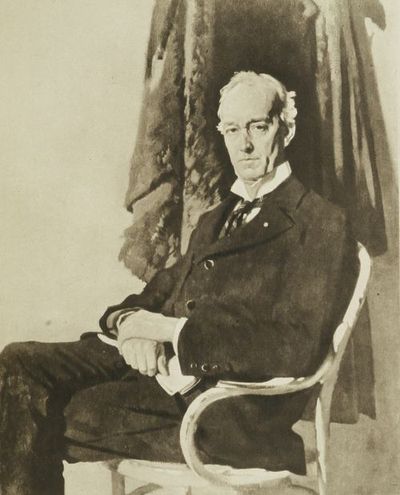
XLIX. Lord Riddell.
One night I dined at "Ciro's" with George Adam and some others. I was late when I came in. Before we went into the dining-room, Adam told me to take notice of an English lady who was sitting a couple of tables away from ours. This I did, and I remembered having seen her constantly at the "Berkeley Hotel," London, years before. She was most peculiarly dressed in some sort of stuff that looked like curtains, tall and slim, with a refined, good-looking face, but a somewhat strange look in her eyes. She was with two men. Presently a lady joined the group from another table. Dancing began, and she left with one of the men, danced and came back again. I could not remember her name, so I asked Philippe, who told me she was an English duchess, but he could not remember what she duched over.
After dinner we went out and sat and watched the dancing and I forgot all about her. About eleven o'clock, during a lull between dances, she appeared before me. The moment (p. 114) she appeared two large waiters seized her by the back of the neck and ran her up the dance-hall and threw her out. A strange sight, surely! An English "duchess" being thrown out of a dance-hall in Paris.
Having been given a most excellent dinner by Adam, my feelings were roused at this peculiar treatment of the English aristocracy, so I went over to Philippe and asked him what he meant by this disgraceful behaviour to an English lady. He replied: "The men she was with left an hour ago." "But," said I, "I never saw her behave badly. Why didn't you ask her to leave?" "I did," said he, "but she just patted me on the back, and said, 'Don't let that worry you, old chap.'" Still, my feelings—thanks still to the dinner—were roused, so I went out into the hall to try and find her, as I had noticed she was wearing about twenty thousand pounds' worth of pearls round her neck. Not that I meant to take these, but I hated the thought of someone else doing so, and I wished to see her safely home, but she had gone—vanished! The only thing I learnt was that she was staying at the "Ritz." But when I inquired there they informed me that they were housing no English duchess.
A few days later I was passing the "Hôtel Chatham" and I saw her coming towards me, very well dressed, in white furs this time and the large globes of pearls still round her neck. She walked straight up to me: "I want you to do something for me," she said. I don't remember what I replied, but she said: "Don't be frightened—it's not immoral. I'm not that sort. I just want you to come along with me to 'The Hole in the Wall.'" "Where is it?" I asked. "I don't know," she said. "That's what I want you for. I want you to find 'The Hole in the Wall.'" "I'm (p. 115) sorry, Madam," I said, "I can't do it. I've got an engagement." She wiggled her finger in front of my nose, and said: "Ah, naughty, naughty boy!" and went on her way. I followed at a safe distance. Every man she met, no matter what class or nationality, she stopped, all the way down the boulevard, and asked them to find "The Hole in the Wall" for her.
None did, however, even though she was quite near it all the time, and the last I saw of her was when she disappeared down the steps of Olympia alone. Not quite the place for an English "duchess" to go alone, with twenty thousand pounds' worth of pearls in full view. I wonder who she was and where she is now? Perhaps in "The Hole in the Wall."
About this time I introduced Lord Riddell to Mrs. Glyn, and we had some very amusing out-of-door dinners at Laurent's. During dinner and afterwards, Mrs. Glyn would teach us many things about life, Nature and love: why women lost their lovers; why men did not keep their wives; the correct way to make love; the stupid ordinary methods of the male; what the female expected; what she ought to expect, and what she mostly got. It was all very pleasant, the modulated voice of Elinor under the trees and twinkling stars. Her elocution was certainly remarkable, and Lord Riddell's dinners excellent.
The great day of the signing of the Peace was drawing near, and I worked hard to get the centre window in the Hall of Mirrors reserved for the artists. In the end, the French authorities sanctioned this. They also promised to do a lot more things which would have made the ceremony much more imposing, but these they did not do. It is a strange thought, but surely true, that the French as a nation seem to take, at present, little interest in pomp and ceremony. The meetings of the delegates at the "Quai d'Orsay," the handing over of the Peace Terms to our late enemies, were all rather rough-and-tumble affairs, and, in the end, the great signing of the Treaty had not as much dignity as a sale at Christie's. How different must the performance have been in 1870! One man, at least, was there who knew the difference—Lord Dunraven, who attended both ceremonies.
I drove out in the morning to Versailles with George Mair and Adam, and we all had lunch at the "Hôtel des Reservoirs." When we started to go to the Palace I found they had yellow Press tickets, by which they were admitted by the side gate nearest the hotel; but I had a white ticket, and had to enter by the main front gate. When I went round towards this gate I found that all the way down the square, and further along the road as far as the eye could see, (p. 117) the route was lined with people, about one hundred deep, with two rows of French cavalry in front. These people had all taken their places, and they would not let me through. I thought for sure I was going to miss the show, and the sweat of nerves broke out on me. By great luck I met a French Captain, to whom I, in my very broken French, explained my plight. He was most kind, took my card, made a way through the crowd, explained and showed my card to the military horsemen, and I was let through. Then the sweat began to run. I found myself about three-quarters of a mile away from the entrance to the Palace, all by myself in this human-sided avenue—thousands of people staring at me. I expected every minute to be arrested. Naturally, no one else entered on foot. They all drove up in their cars. Guards at the gates scanned my dripping face, but not a word was uttered to me, no pass was asked for—nothing!
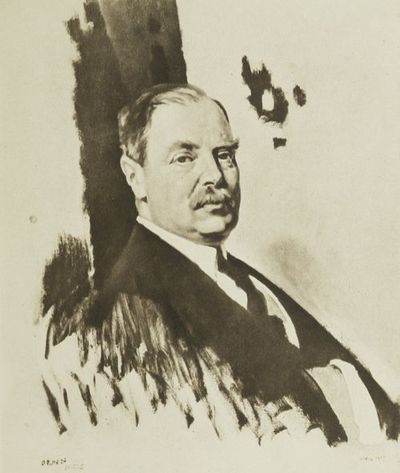
L. The Rt. Hon. the Earl of Derby, K.G., etc.
The marble staircase was most imposing, lined on each side by Municipal Guards, but the Hall of Mirrors was pandemonium, a mass of little humans, all trying to get to different places. In the end I got to the centre window. It was empty. I was the first artist to arrive, and very satisfied I was to have got there safely. Suddenly, up walked a French Colonel, who told me to get out. I showed him my card and told him this was the window reserved for artists. He explained that this had been changed, and that the next window was reserved for them, and led me off there. There I found all the French and American artists huddled together. As soon as the Colonel left, I crept back to the centre window. I was turned back again. This creeping to the centre window and being turned back continued (p. 118) till I spoke to M. Arnavon, who advised me to stop in the artists' window till just before the show started, and then to go to the middle window. Just before the beginning there was great excitement. A stream of secretaries came up the Hall, two carrying chairs, and with them two grubby-looking old men. The chairs were placed in the centre window, and the old chaps sat themselves down. They were country friends of Clemenceau's, and he had said that morning that they were to have the centre window, and that artists could go to—somewhere else. When the proceedings commenced I slipped in behind their chairs, and, except for a glare from "Le Tigre," I was left in peace.
Clemenceau rose and said a few words expressing a desire that the Germans would come forward and sign. Even while he was saying these few words the whole hall was in movement—nothing but little black figures rushing about and crushing each other. Then, amidst a mass of secretaries from the French Foreign Office, the two Germans, Hermann Müller and Doctor Bell, came nervously forward, signed, and were led back to their places. Some guns went off on the terrace—the windows rattled. Everyone looked rather nervous for a moment, and the show was over, except for the signatures of the Allies. These were written without any dignity. People talked and cracked jokes to each other across tables. Lloyd George found a friend on his way up to sign his name, and as he had a story to tell him, the whole show was held up for a bit, but after all, it may have been a good story. All the "frocks" did all their tricks to perfection. President Wilson showed his back teeth; Lloyd George waved his Asquithian mane; Clemenceau whirled his grey-gloved hands about like windmills; Lansing drew his pictures (p. 119) and Mr. Balfour slept. It was all over. The "frocks" had won the war. The "frocks" had signed the Peace! The Army was forgotten. Some dead and forgotten, others maimed and forgotten, others alive and well—but equally forgotten. Yet the sun shone outside my window and the fountains played, and the German Army—what was left of it—was a long, long way from Paris.
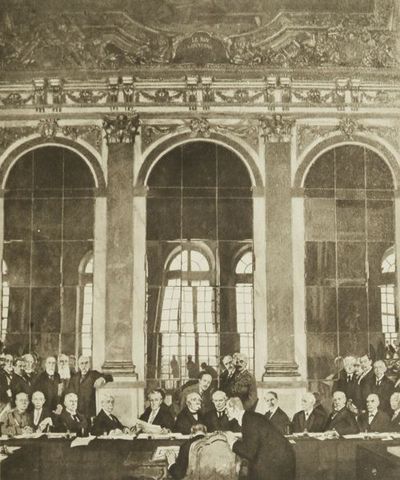
LI. Signing the Peace Treaty.
After seeing some of the great little black-coated ones leave, amidst great cheering, George Mair, Colonel Stroud Jackson and I went to the aerodrome and saw the Press photographs sent off to the waiting crowds in the British Isles. Then back to Paris. Paris was very calm, not the least excited. I remember Mair gave some of us dinner at Ciro's that night. When the band played the Marseillaise, we stood up on our chairs, held hands and sang and cheered, but no one else moved, so in the end we got down, feeling damned fools. It was all rather sad!
The next great show was the triumphal march through the Arc de Triomphe. It was fine! But it must be admitted that the Americans scored. They had picked men trained for months for this march, and along they came in close formation, wearing steel helmets. It was a fine sight!
But there were great moments when Foch passed, and when Haig passed at the head of his men, and the roars that came from the "Astoria" must have been heard a long way off. The "Astoria" was the hotel reserved by the Kaiser for his friends to witness his triumphal entry into Paris, so we had a good view. He chose well.
I remember during the war, when a "frock" visited some fighting zone, he was always very well looked after and entertained by whatever H.Q. he visited, and I was amazed on (p. 120) this day to find Field-Marshal Lord Haig and General Sir John Davidson lunching alone at the "Majestic." Lord Allenby was also lunching at another table and General Robertson at another. To me it was ununderstandable. These representatives of the dead and the living of the British Army, on the day of its glory, being allowed to lunch alone, much as they might have wished it.
As far as I remember, Lord Derby gave a dinner in their honour that evening, but I am certain the "frocks" did nothing. After all, why should they fuss themselves? The fighting was over. The Army was nothing—harmless! Why should they trouble about these men? Why upset themselves and their pleasures by remembering the little upturned hands on the duckboards, or the bodies lying in the water in the shell-holes, or the hell and bloody damnation of the four years and odd months of war, or the men and their commanders who pulled them through from a bloodier and worse damnation and set them up to dictate a peace for the world?
The war was over, the Germans were a long, long way from the coast or Paris. The whole thing was finished. Why worry now to honour the representatives of the dead, or the maimed, or the blind, or the living that remained? Why? In Heaven's name, why not?
I remember one day, during the Peace Conference in the "Astoria," asking a great English General about the delegates and how things were getting on, and he said: "I wish the little 'frocks' would leave it to us—those who fight know best how to make peace. We would not talk so much, but we would get things settled more quickly and better." Surely that was the truth!
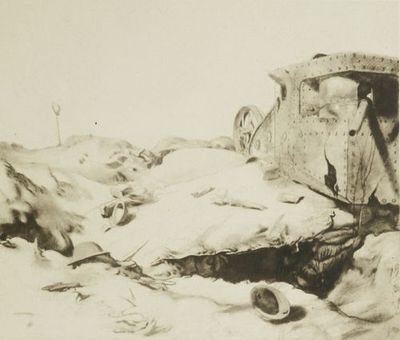
LII. End of a Hero and a Tank, Courcelette.
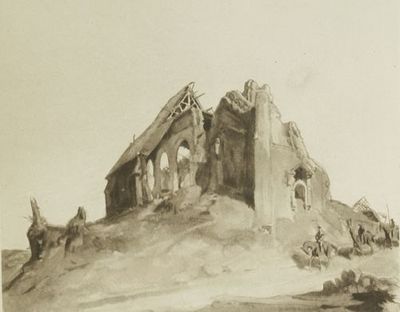
LIII. General Birdwood Returning to his Headquarters—Grévillers.
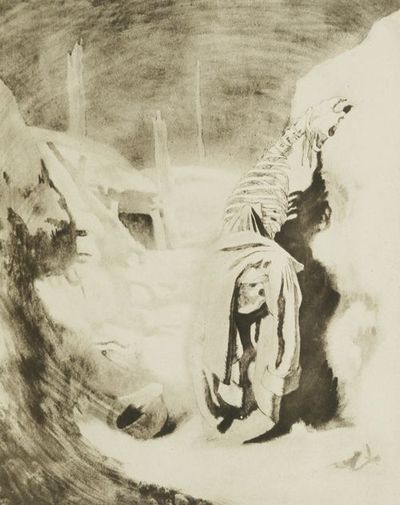
LIV. A Skeleton in a Trench.
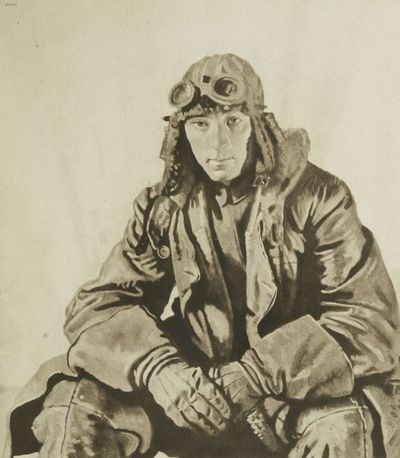
LV. Flight-Sergeant, R.F.C.
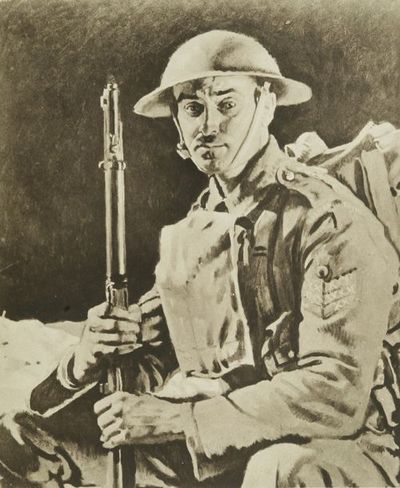
LVI. N.C.O. Grenadier Guards.
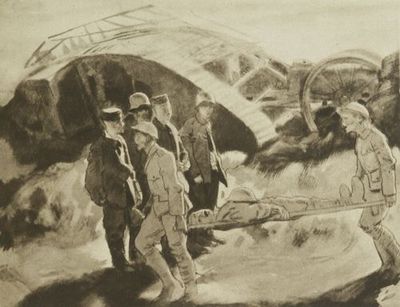
LVII. Stretcher-bearers.
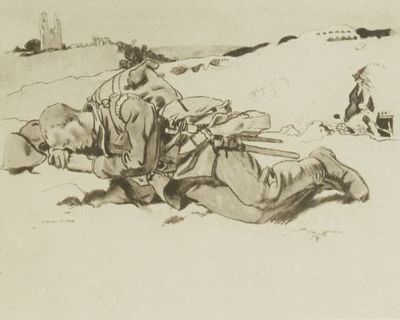
LVIII. Man Resting, near Arras.
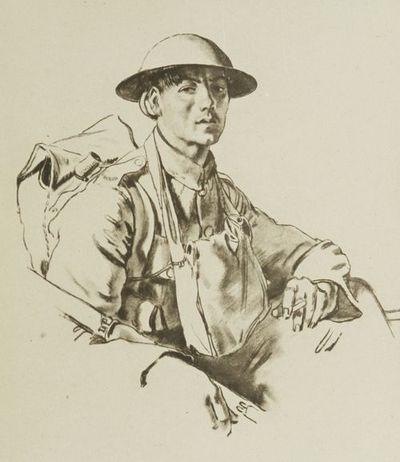
LIX. Going Home to be Married.
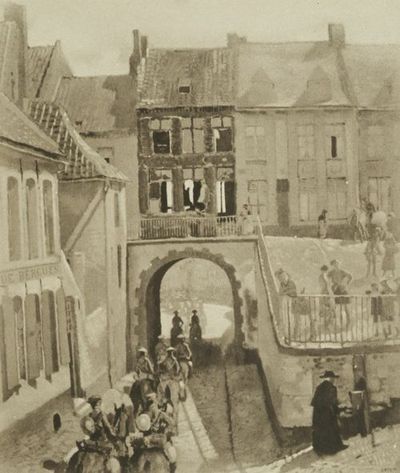
LX. Household Brigade Passing to the Ypres Salient, Cassel.
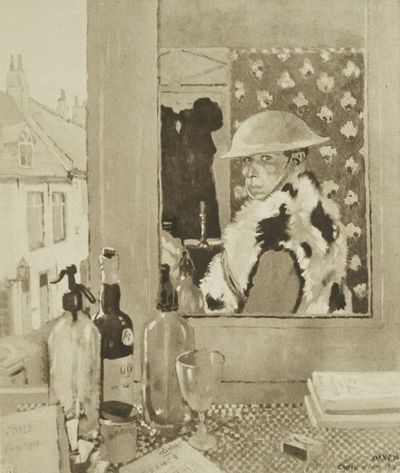
LXI. Ready to Start.
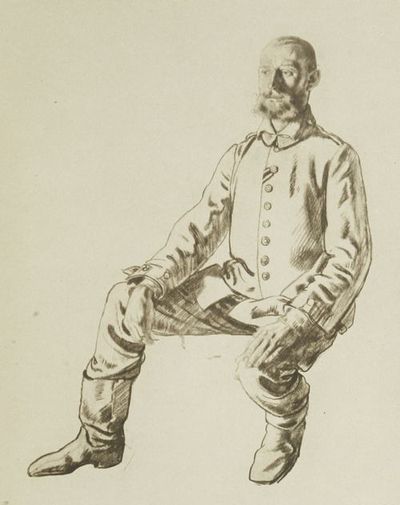
LXII. German Prisoner with the Iron Cross.
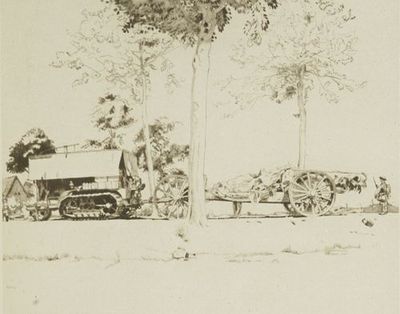
LXIII. A Big Gun and its Guardian.
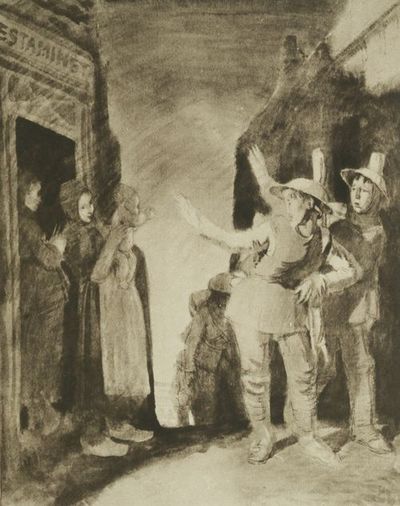
LXIV. "Good-bye-ee."
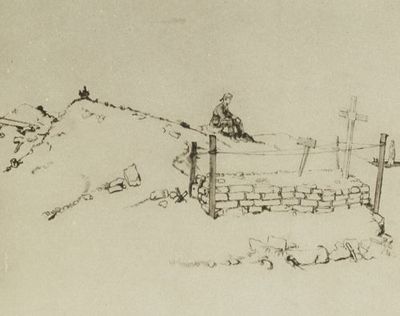
LXV. The Château, Thiepval.
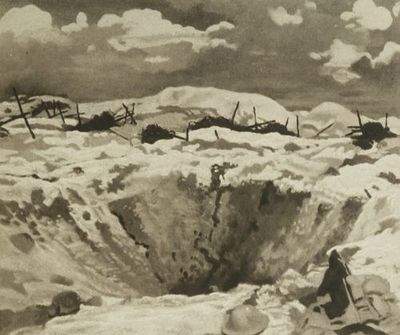
LXVI. German Wire, Thiepval.
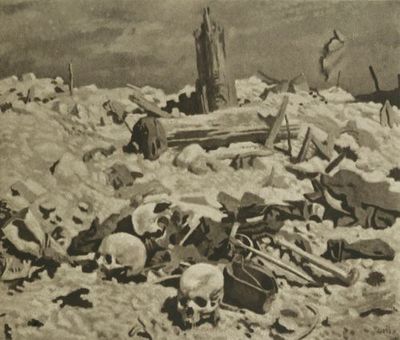
LXVII. Thiepval.
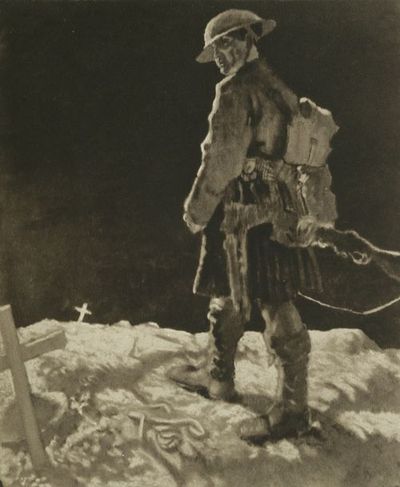
LXVIII. Highlander Passing a Grave.
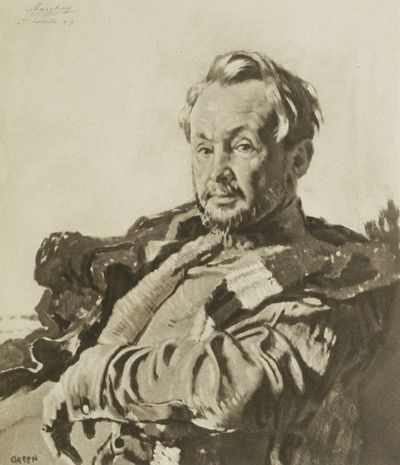
LXIX. M. R. D. de Maratray.
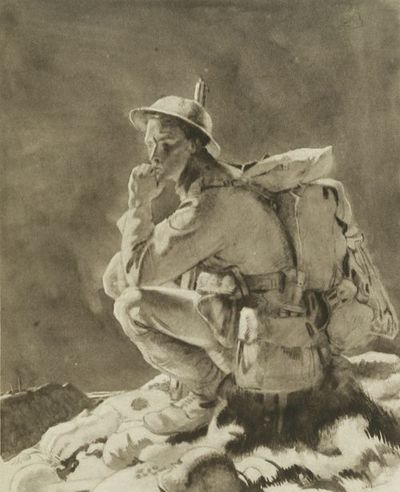
LXX. A Man Thinking, on the Butte de Warlencourt.
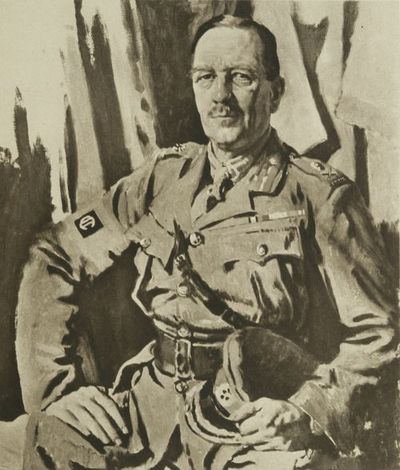
LXXI. Major-General Sir Henry Burstall, K.C.B., etc.
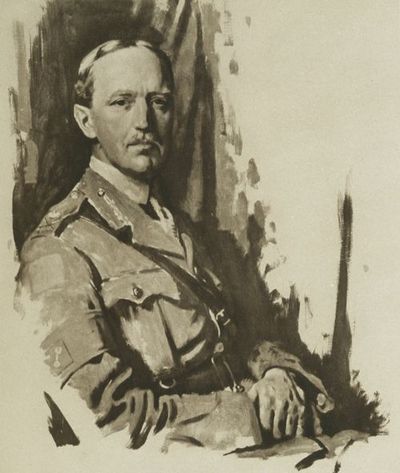
LXXII. Major-General L. J. Lipsett, C.M.G.
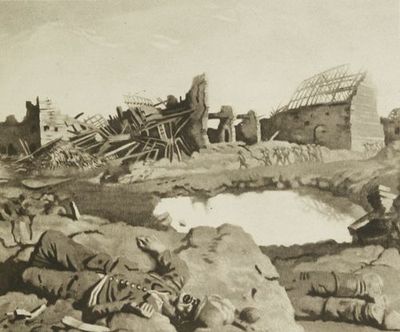
LXXIII. A Village. Evening. (Monchy).
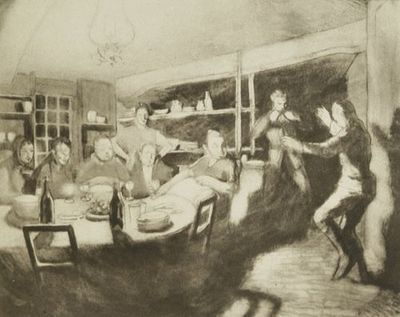
LXXIV. Christmas Night, Cassel.
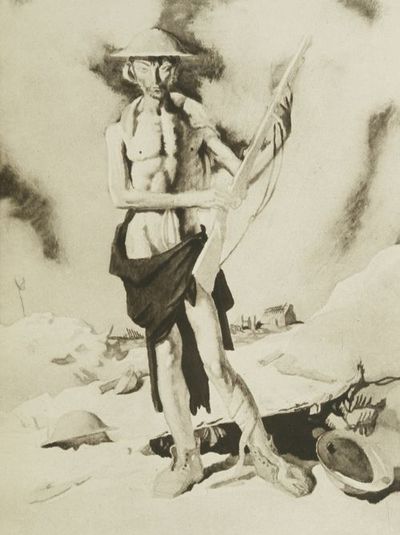
LXXV. Blown Up. Mad.
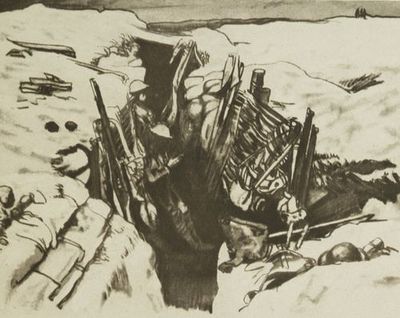
LXXVI. A Support Trench.
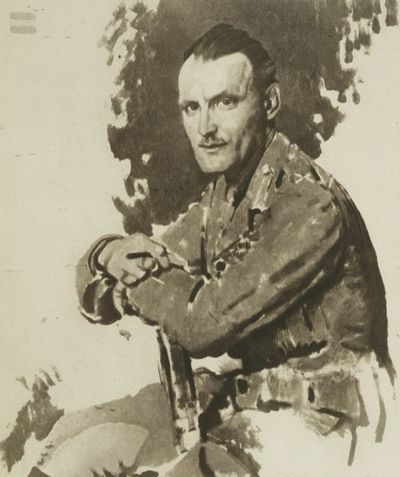
LXXVII. Major-General Sir H. J. Elles, K.C.M.G., etc.
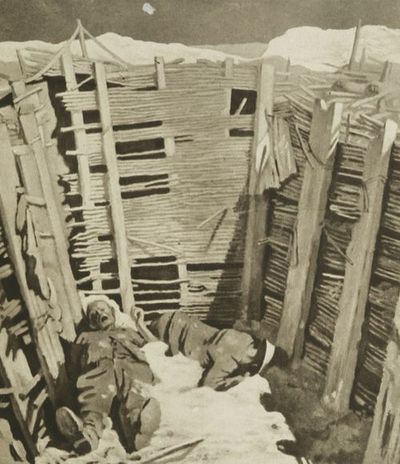
LXXVIII. Dead Germans in a Trench.
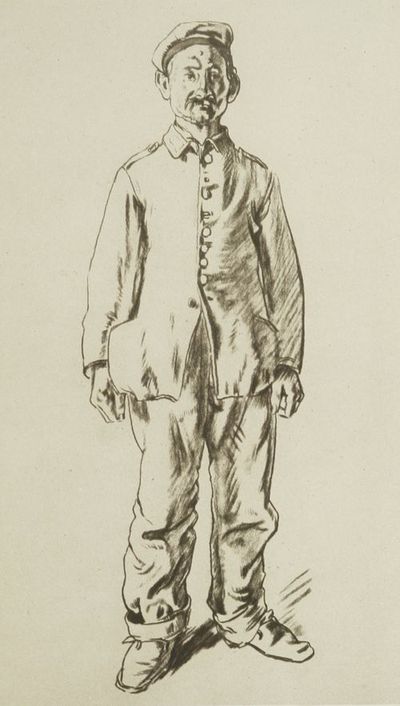
LXXIX. A German Prisoner.
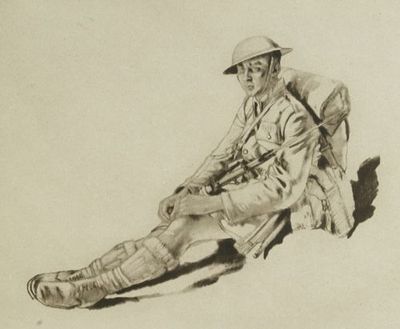
LXXX. A Highlander Resting.
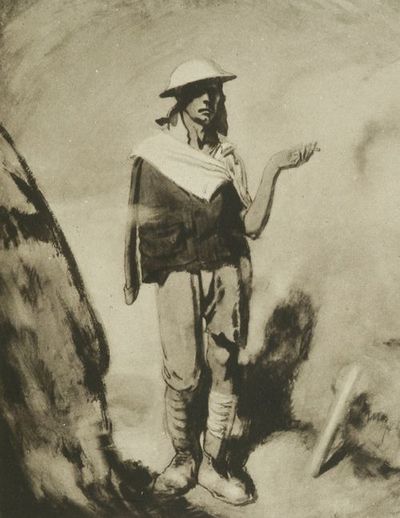
LXXXI. A Man with a Cigarette.
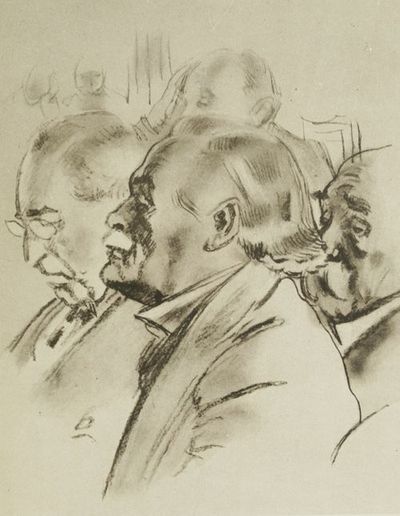
LXXXII. Mr. Lloyd George, President Wilson and M. Clemenceau.
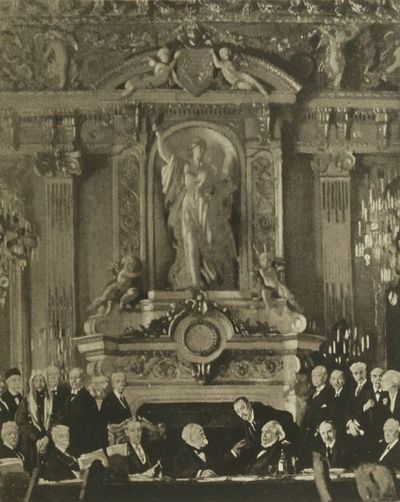
LXXXIII. A Meeting of the Peace Conference.
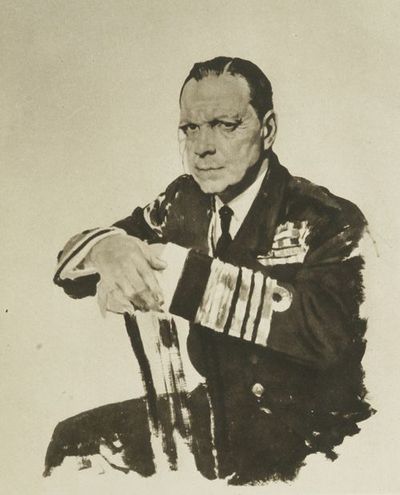
LXXXIV. Admiral of the Fleet Lord Wester Wemyss, G.C.B.
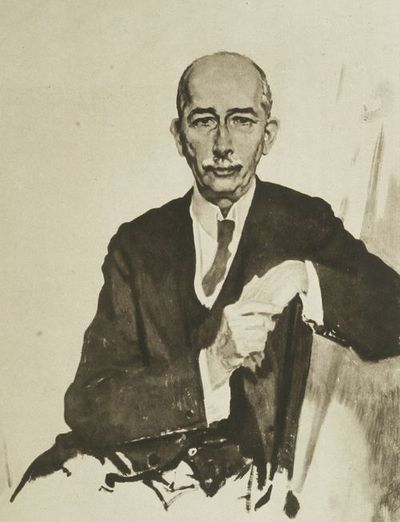
LXXXV. Colonel Edward M. House.
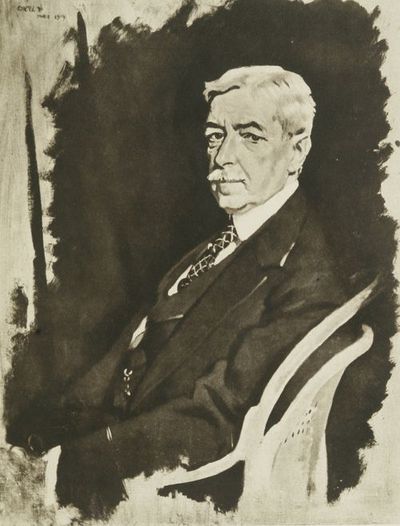
LXXXVI. Mr. Robert Lansing.
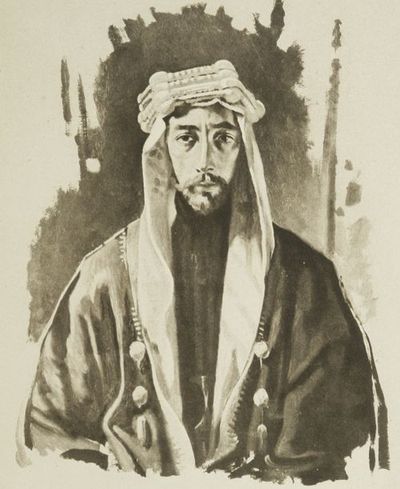
LXXXVII. The Emir Feisul.
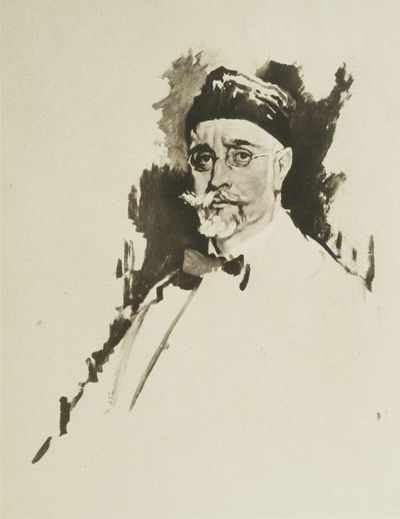
LXXXVIII. M. Eleutherios Venezelos.
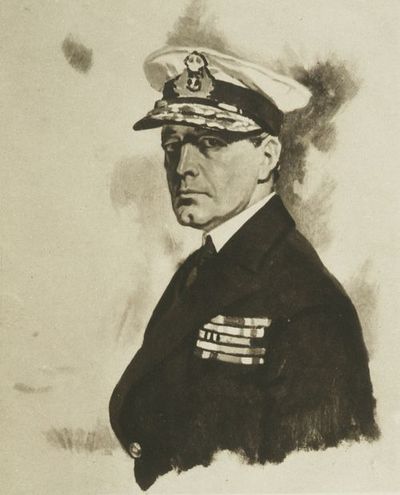
LXXXIX. Admiral of the Fleet Sir David Beatty, Viscount Borodale of Wexford. O.M., G.C.B., etc.
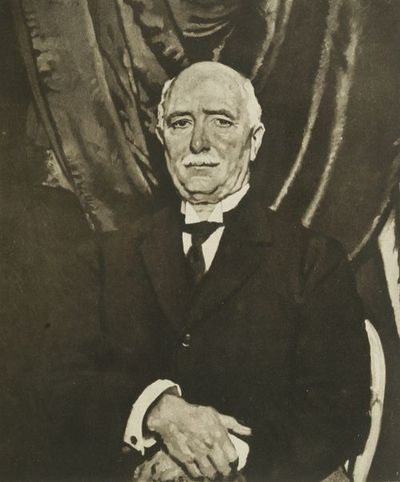
XC. The Rt. Hon. W. F. Massey, P.C.
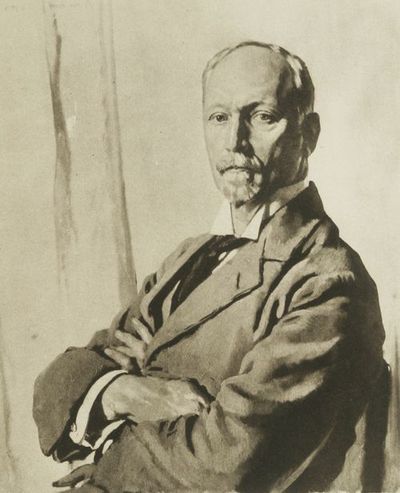
XCI. General the Rt. Hon. J. C. Smuts, P.C., C.H.
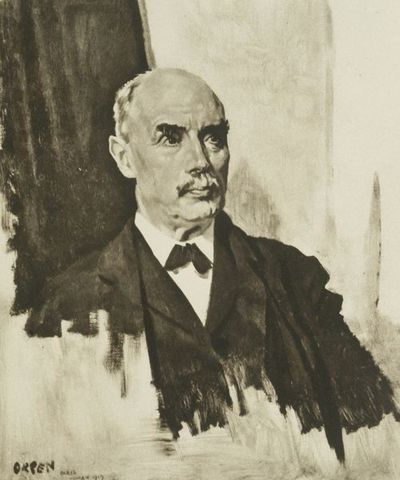
XCII. The Rt. Hon. G. N. Barnes, P.C.
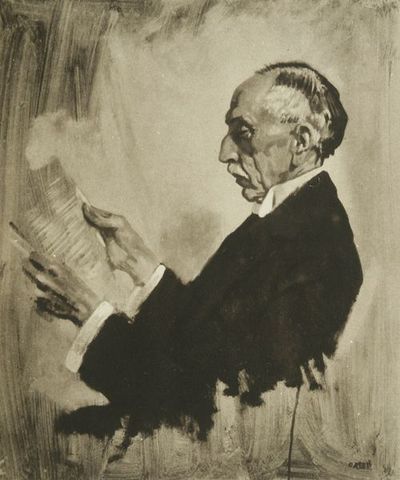
XCIII. The Rt. Hon. W. M. Hughes, P.C., K.G.
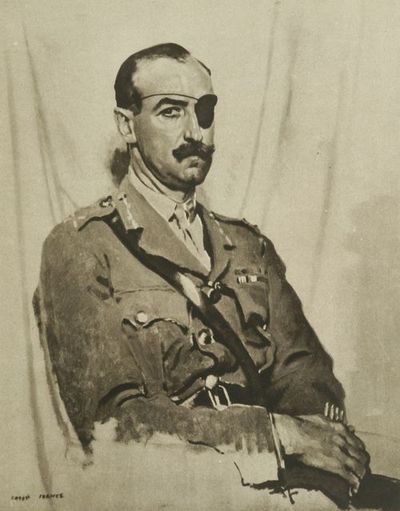
XCIV. Brigadier-General A. Carton de Wiart, V.C., C.B., etc.
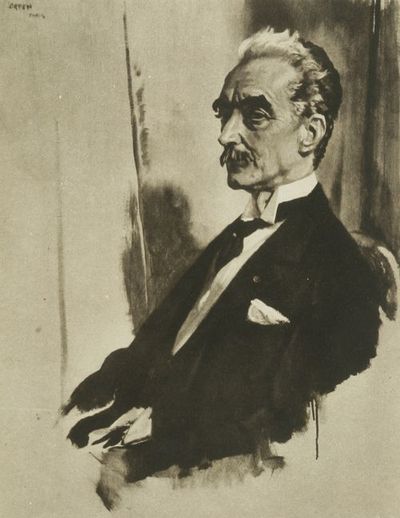
XCV. M. Paul Hymans.
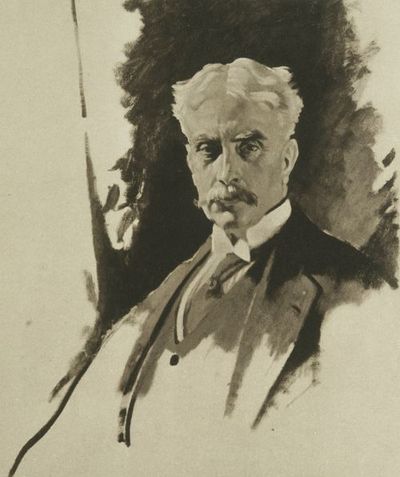
XCVI. The Rt. Hon. Sir R. L. Borden, G.C.M.G., etc.
(The Arabic figures refer to the pages of the Text; the Roman figures to the Plates.)
Adam, George,
100,
108,
112,
113,
116.
Aikman, Captain T. T.,
12,
55.
Albert,
20,
37,
40,
79,
80,
86;
XXXVII.
Allenby, General Lord,
120.
Amiens,
16 ff.,
40 ff.,
59,
70,
71,
76,
79,
82,
92,
96;
XXXV,
XL.
Ancre, Valley of the,
38.
Antoine of Bourbon (Prince),
65.
Armentières,
31.
Arnavon, M.,
118.
Aveluy,
39.
Bailleul,
33,
95.
Balfour, A. J.,
100,
105,
119;
XLV.
Bapaume,
20,
70.
Bapaume Road,
18,
48;
II.
Baring, Maurice,
19,
29 ff.,
50,
69.
Barnes, G. N.,
109;
XCII.
Bazentin-le-Grand,
20.
Bazentin-le-Petit,
20.
Beatty, Admiral Lord,
107;
LXXXIX.
Beaumont-Hamel,
20,
23,
48.
Beaverbrook, Lord,
42,
67,
70,
95.
Bedelo, Signor,
56.
Belfield, Colonel,
45,
56.
Bell, Dr.,
118.
Bertangles,
80,
81.
Birdwood, General,
19;
LIII.
Bloomfield, Major,
50 ff.,
86.
Borden, Sir Robert,
106;
XCVI.
Botha, General Louis,
102;
XLIV.
Boulogne,
12,
31,
42,
57,
67,
71.
Brickman, Captain,
56.
Brooks, Lieutenant,
99.
Buchan, Colonel John,
20.
Burstall, General,
49;
LXXI.
Cambrai,
61.
Carstairs, Carroll,
46,
61,
87.
Carton de Wiart, General,
110;
XCIV.
Cassel,
31 ff.,
42 ff.,
51 ff.,
93;
XI,
XII,
LX,
LXXIV.
Caudry,
90.
Charteris, General,
14.
Château Thierry,
70,
76.
Clark, Lieutenant,
38.
Clemenceau, M.,
76,
100,
103,
110,
118;
LI,
LXXXII,
LXXXIII.
Clermont,
55.
Corbie,
37.
Cough-drop, the,
20,
48.
Courage, Ernest,
45,
56,
64.
Courcelette,
20;
LII.
Cowans, General Sir J. S.,
99;
XLII.
Currie, General,
49,
67.
Da Costa, Senhor,
106.
Dark, Sidney,
100.
Davids, Lieutenant A. P. Rhys,
50;
XX.
Davidson, General Sir John,
63,
72,
120.
Derby, Lord,
109,
112,
120;
L.
Dieppe,
35.
Dillon, Dr. E. J.,
105.
Douai,
91;
XXXVIII.
Douglas, Captain,
75.
Doullens,
96.
Du Cane, General Sir J.,
77.
Dunraven, Lord,
116.
Elles, General,
62;
LXXVII.
Ellis, Admiral Heaton,
108.
Estre Blanche,
50.
Fane, Major F.,
17,
25.
Feisul, Emir,
105;
LXXXVII.
Fletcher, Colonel,
28,
63,
72.
Foch, Marshal,
76 ff.;
XXXIII.
Forsyth, Dudley,
75.
Freeman, Colonel,
29.
French, Field-Marshal Lord,
31.
George, Mr. D. Lloyd,
100,
101,
103,
118;
LI,
LXXXII,
LXXXIII.
Gibbs, Sir Philip,
32.
Glyn, Mrs.,
115.
Grandcourt,
20.
Grant, General,
77,
79.
Gregory, Robert,
30.
Grévillers,
19;
LIII.
Haig, Field-Marshal Earl,
27,
50,
64,
72,
97,
120;
I.
Hale, Captain,
18,
56,
64;
XXVI.
Hankey, Sir Maurice,
113.
Hesdin,
13,
42,
63.
Highwood,
20.
Hogg, Major,
56.
Hoidge, Captain,
50,
51,
86;
XXI.
Holland, Captain,
76.
Hotblack, Major,
62.
House, Colonel,
104;
LXXXV.
Hughes, W. M.,
110;
XCIII.
Hymans, M. Paul,
110;
XCV.
Inge, Captain,
56,
64.
Inverforth, Lord,
55.
Jackson, Lieut.-Colonel Stroud,
100,
119.
Joffroy, M.,
39.
Knox, Gordon, 100.
La Boisselle,
20,
40,
48,
70;
III,
XIV,
XVIII.
Laboreur, M.,
26.
Lansing, Mr. R.,
104,
118;
LXXXVI.
Lee, Major A. N.,
67,
69,
72,
75;
XXXII.
Le Havre,
35,
47.
Le Sars,
19,
49.
Lipsett, Major-General,
49;
LXXII.
Little, Captain,
30.
Locre,
95.
Lucas, Lord,
29.
MacColl, Captain,
62.
McCudden, Major,
53,
69;
XXX.
McDonnell, Colonel Angus,
90,
98.
MacDonough, General,
69.
MacDowell, Colonel,
56.
Macintosh, Mr.,
64.
Mahon, Major-General Sir Bryan,
93.
Mair, George,
100,
112,
116,
119.
Maratray, M. R. D. de,
18,
44;
LXIX.
Masefield, John,
40,
41.
Massey, W. F.,
108;
XC.
Maude, Captain F.,
44 ff.,
56,
61,
66,
80,
84,
96,
98;
XXXV.
Menin Road,
95.
Miraumont,
20.
Monchy,
LXXIII.
Montdidier,
70.
Mont St. Eloy,
29.
Müller, Herr,
118.
Munnings, A. J.,
65.
Nieuport, 31.
O'Connor, Major,
49.
Orlando, Signor,
103.
Orpen, Captain,
57.
Paderewski,
101.
Paris,
49,
55,
70,
98.
Peace Conference,
98 ff.;
LXXXIII.
Peace Treaty,
116 ff.;
LI.
Péronne,
20,
37,
70;
V,
XV.
Phillips, Percival,
32.
Plumer, General Lord,
93 ff.;
XXXIX.
Pozières,
19,
70;
IV.
Rawlinson, General Lord,
80,
81;
XXXVI.
Read, Mrs.,
113.
Reading, Lord,
105.
Riddell, Lord,
100,
112,
115;
XLIX.
Riviere, Captain,
98.
Robertson, General Sir William,
120.
Rœux,
28.
Rogers, General,
80.
Rollencourt,
13,
21.
Rouen,
35.
Sackville-West, General,
107.
St. Denis,
79;
XXXIV.
St. Omer,
31,
57.
St. Pol,
26,
67.
St. Quentin,
90.
St. Valery-sur-Somme,
72,
75.
Sargent, John,
16.
Sassoon, Sir Philip,
27,
35,
51,
63.
Seely, General,
65,
67;
XXVIII.
Siongi, Marquis,
100,
108;
XLVII.
Smuts, General J. C.,
108;
XCI.
Soissons,
70,
76.
Somme, the,
16 ff.
Stevens, Captain,
98.
Strang, Ian,
67.
Stuart, General,
90.
Sykes, General,
106.
Thiepval,
20,
36 ff.;
LXV,
LXVI,
LXVII.
Thomas, Beach,
32.
Trafford, Captain Rudolf de,
64,
72.
Trenchard, Air-Marshal Sir H. M.,
29,
50,
52;
IX.
Tyl, Colonel du,
80;
XXXV.
Vaux,
79.
Venezelos, M. E.,
105;
LXXXVIII.
Villers-Bretonneux,
70,
76.
Villers-Carbonelle,
81.
Warlencourt, Butte de,
19,
49;
XIX,
LXX.
Watson, General,
49.
Wester Wemyss, Admiral Lord,
104;
LXXXIV.
Weygand, General,
77.
Williams, Brigadier-General Dame Vaughan,
82.
Wilson, Field-Marshal Sir Henry,
102,
112;
XLIII.
Wilson, President,
100,
103,
104,
106,
107,
118;
XLVI,
LI,
LXXXII,
LXXXIII.
Woodcock, Colonel,
45,
56.